#what these movies have in common is not the form the queer coding takes but the propaganda for the usarican military cop industrial complex
Text
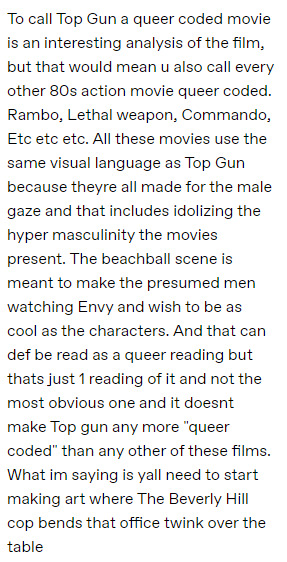
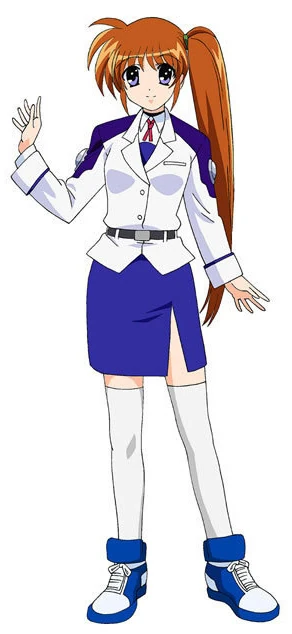
every single tony scott movie is queer coded. i don't think every action 80s movie is, and i actually don't think rambo is that gay. commando is pretty gay, that is not a new take. as far as queer coded villains go, mark l. lester, who directed it, has spoken openly on it. the lethal weapons movies were written by shane black, who some people (me, for the first time right now) have described as "only ever making homoerotic christmas movies". beverly hills cop 2 was directed by tony scott. the issue isn't top gun having a normie amount of male gaze mistakenable for gay longing, it's people not drawing gay erotic beverly hills cop fanart. so we agree on that.
#top guns visual language is actually quite peculiar#what these movies have in common is not the form the queer coding takes but the propaganda for the usarican military cop industrial complex#we may belive it was just the virulently sexist 80s idolizing the male form when in fact there was 3 or 4 extremely prolific#directors and screenwriters of the era who's art consistently reads “some flavour of closet case”.#very “people thought freddy mercury was straight”-adjacent#and most importantly. ridley scott directed several movies in the 80s and none of them are gay.#blade runner has a gay character (roy batty) but it's not a gay film. so the closest we get is Legend '85. black rain '89 is like a tony#scott movie but without that genuine sprinkle of weird issues#paul verhooven does make gay movies but almost exclusively about lesbians. etc#post shortening nanoha#i don't watch good movies btw not lately
2 notes
·
View notes
Text
125. Nimona, by ND Stevenson
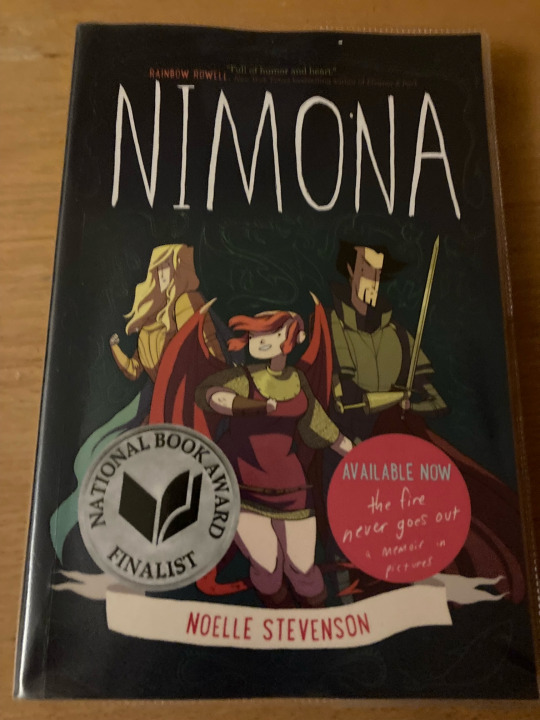
Owned: No, library
Page count: 256
My summary: Notorious villain Ballister Blackheart wants to strike a blow at the Institution who failed him so many years ago. He's logical, precise, efficient...so when anarchic shapeshifter Nimona appears on the scene, he's thrown into disarray. When the pair of them discover an Institute conspiracy, they have to scramble to protect the world. But what else will they uncover in their search for the truth? And will they both survive it?
My rating: 5/5
My commentary:
Nimona! After the movie came out, it seemed like a lot of people were suddenly getting back into Nimona, which I 100% endorse. I read this a while ago, it was (highly!) recommended by a friend, and I devoured it in one sitting, if memory holds. That was a good few years ago, though, and in the intervening time I had forgotten most of the story, so when I saw it drift through the library I couldn't resist picking it up for myself. And then going out and buying a copy. Turns out this book is really good, who knew?
I just love the dynamic between our two main characters here. Nimona is a spunky girl, naturally anti-authoritarian and punky, with a crude sense of humour and a tendency towards ruthlessness. She just appears to Ballister Blackheart, local Villain who is working to take down the oppressive Institution, who has a strict sense of justice and moral code. Naturally, despite their common goals, they are at odds as to method. Blackheart is exactly my favourite kind of character - an angsty man who is doing what he believes to be just and right despite the entire world being against him. Also he's totally in love with the Institute's Hero, Ambrosius Goldenloin. And Nimona is just anarchic and chaotic, totally willing to cut that Gordian knot and get down to brass tacks. She's really fun to read, and their dynamic as a pairing, with Blackheart slowly learning to like her and Nimona almost becoming more domestic in his presence, is very cute. Their arc is well-earned, and despite it being heartbreaking I really like that Nimona just straight-up disappears at the end. This isn't the kind of world where characters get neat happy endings tied up in a bow, and it would have felt disingenuous to include something like that. Nevertheless, the ending feels satisfying, and that's always great to see.
Meanwhile, the other reason this story is cool - it's very, very easy to read as a queer metaphor. See, Nimona's a shapeshifter, and doesn't really have a default form so much. She's a raging monster or dragon just as much as she's a cat, or a human. The fact that ND Stevenson is himself trans makes this way more interesting. Bodies being fluid, that identity shifting constantly and being perceived as monstrous by an oppressive authority, becoming the monster because that's all anyone has ever expected of you, the definitely-gay Ballister going from perceiving himself as a Villain to a Hero, Ballister being cast out because he's not as palatable a hero as the golden-haired Goldenloin, the Institute being the ones to break up Ballister and Goldenloin's relationship initially…there's so much going on here with gender and sexuality, and it's absolutely delicious. And yet, it's never preachy with it. The metaphor is present, and it's not particularly hidden, but it's never so explicit to feel glaring or out of place. It's very well-done, and I have to commend Stevenson for it!
Next up, back to 1800s America, and a Black community struggling to survive.
23 notes
·
View notes
Text
Autism Allegories - Zane from Ninjago.
(Edited to have a cut, your welcome!)
This is intended to be a random rant due to how disheartened I was from someone else not mentioning it or regarding the topic negatively. It's a weird thing for a first post, but something with passion nonetheless.
Many stereotypes surround autistic people within different media, as well as coding of all forms within the writing. (Queer coding, Trans coding, etc.)
Most people who are actively looking for autistic representation or accidentally stumble upon it are well aware of the common male stereotype of a highly intelligent, logical, non-sarcasm-grasping young man who is most often white or cisgender.
This is common, and can still resonate with autistic people even if it is overused and doesn't represent the wide spectrum that are people with autism. (Pun intended.)
While Zane from Ninjago, (a Lego series with nearly fifteen seasons, one spin-off movie, and a new production in the making,) carries a lot of the traits that an autistic person could have. (Both in a realistic fashion and perhaps a stereotypical fashion, as robots are often coded to be neurodivergent to show them being 'unhuman' and 'different.') However, this does not come from a negative point of view in my eyes.
I think Zane is a wonderful allegory for a person with autism, they acknowledge that he's odd. But they (the team of ninjas and Sensei Wu) all take him as he is. Not accept him, because accepting something about someone implies there is something inherently wrong with them. But are content and allow him to be him.
Now, here comes the part of this that disheartened me. I looked up this same thing I am ranting on, and saw multiple people agreeing that Zane has autistic traits. All of them, however, would deny him being autistic.
Now here is the kicker. Zane cannot be autistic due to him not having human anatomy besides his resemblance to one. This is true, but he still carries the experiences and struggles that would come with someone with autism. Hence, my specific wording on him being an allegory for people with autism -- whether this was intentional or not.
As said by Oxford Languages, an allegory is "a story, poem, or picture that can be interpreted to reveal a hidden meaning, typically a moral or political one."
Said as well by Wikipedia, an allegory is "A literary device or artistic form, an allegory is a narrative or visual representation in which a character, place, or event can be interpreted to represent a meaning with moral or political significance." Which goes into a little more depth on the definition.
Zane is a perfect allegory when it comes to the autistic experience, as can be shown just by clips of him being himself. (Which, I will link.)
I believe this allegory is further pushed when we consider the fact that Zane has always stood out and has not been able to grasp the subcontext provided by the humans around him. Social cues can be difficult for those with autism. However, they don't make him entirely incompetent despite this.
Which is great! It's amazing! They treat him just like the other ninja in most cases, allowing him to fully feel like part of the family and not excluded.
One specific moment (which was included in the pilot) was as such:
Sensei Wu was beginning to announce Zane's ability, in which, he would respond with a showy move. Displaying his abilities. Kai, the newest member, would lean towards Cole and whisper.
"I sense this one takes things a little too seriously."
In which, Zane would respond blankly with genuine curiosity.
"You too have the gift?"
Which would bring a light chuckle from Jay. And he would explain to the curious Zane.
"He was just making a joke, Zane." Then lean in close with a mildly concerned expression. "Remember what we talked about? Your sense of humor, huh?"
Then in the most monotone voice, matter-of-factly voice, Zane would respond. "Yes, it was a joke."
With a flat "Haha." Which would earn a face palm from Jay in response.
This would serve to seperate him from the rest of the ninjas, but they would never entirely outcast him due to it. If anything, it gave him his own standing presence among them.
It was an indicator but also an endearing quality to him. If allowed to be, he is a good allegory as he most likely has the same experiences an autistic person would endure. (Being talked down to, struggling with social cues, facing judgement for who they are, and so on.)
(My laptop thought it would be funny to shut off while I was typing this, so I did loose some of my commentary. How rude.)
The negative out look I saw on this and the minor ignorance towards him as a character just made me feel icky and inspire me to do this rant. This is all I have to say for now, but Zane is very special to me in all these little clips of him being himself. (Especially when he doesn't understand gender norms!)
youtube
13 notes
·
View notes
Text
Why the Isle of the Lost cannot possibly have the same standards of heteronormativity and monogamy that Auradon appears to have
Hello everyone I am listening to the first movie soundtrack and feel like I could kill god so let’s go!
So, all the couples and romance we see in Auradon are very much heteronormative and monogamous. Examples being mostly the parents since the kids aren’t really dating that much in the movies till like the third one. Audrey and Ben are like the quintessential representation of a het relationship though. I don’t think that we have ever seen a Lgbtq+ person or couple in all the movies so far? Y’all can correct me if that’s wrong.
Anyway, there’s absolutely no way that the Isle has those same relationship structures. For one, the isle has been isolated for at least twenty years, likely closer to thirty (Note: I have not read any of the books and this is entirely based on the movies). This isolation would likely lead to significant cultural changes without taking into account my next point.
Next, the Isle is entirely composed of villains. Most of these villains are heavily queer-coded, and I would guess that would reflect in the Isle’s view of a “normal” relationship. Now, I am not in any way shape or form saying that being queer is something only “evil” characters can be. The opposite in fact. It makes sense that these villains, who are heavily queer-coded, would influence the Isle to be more accepting of Lgbtq people.
Now, we of course see little evidence of this in the movies (because this is disney), but there are little hints throughout. Uma and Mal’s relationship practically screams “these two dated!”, and the entire thing reads like they’re exes who hate each other. Also, this is where my points about monogamy come in.
In the first movie, Ben asks Mal about dating on the Isle, and her response is that dating on the Isle was more like “gang activity”. I absolutely refuse to believe that whoever wrote that didn’t know what they were doing. That line implies so many things. Firstly, it definitely implies that polyamory is the norm or at the very least accepted on the Isle. I’m definitely leaning towards it being the norm, at least among the younger generation, as it makes sense. Gangs have to be very important on the Isle, as you need people who’ll have your back no matter what. It makes sense that the people you choose to get involved with are the ones you trust to have your back. Also, that line and my previous point definitely point towards dating different genders being normal on the Isle.
Also, quick note: Nonbinary people and trans people have to be more common on the Isle than on Auradon. Not even taking into account Auradon’s heteronormatively, kids are definitely going to explore more on the Isle. It definitely makes sense that they would experiment with gender.
The Isle kids also seem very confused by how relationships work in Auradon, which makes sense, especially if most of their models for relationships are their parents or the “gang activity”. I am of course, not saying that any of this is true, I just think that it makes sense.
Anyway, this has been Descendants post 1/???
#descendants#disney descendants#mal#evie#jay#carlos de vil#ben#I will probably make more descendants posts today and in the future#I am way too invested in these movies#isle of the lost
32 notes
·
View notes
Photo
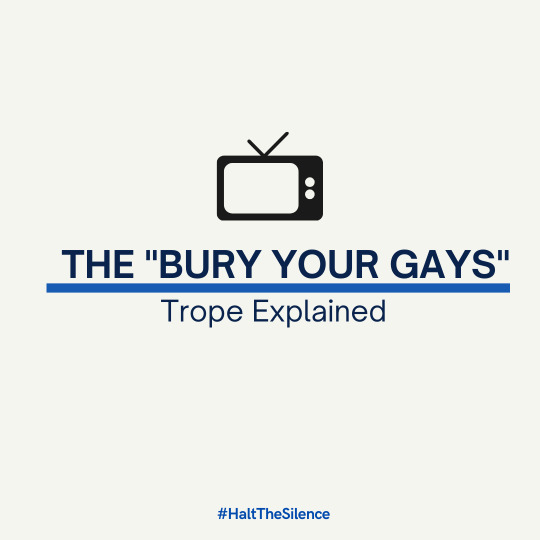

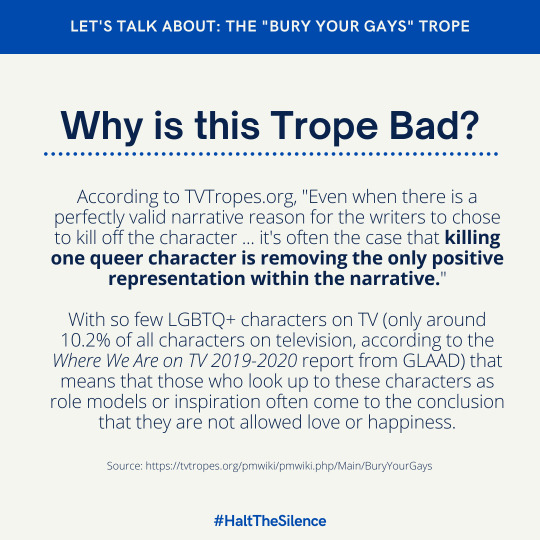



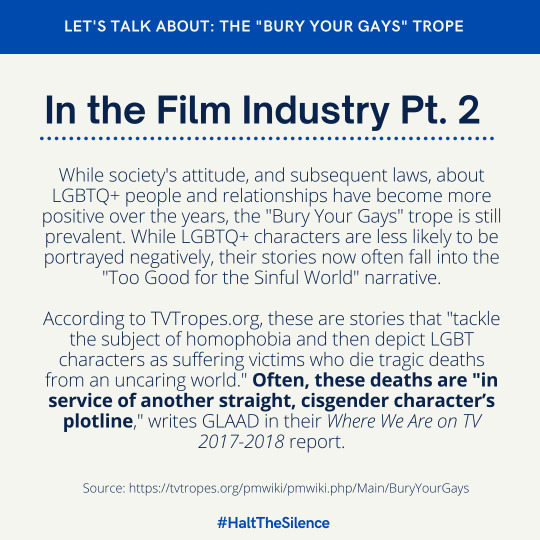
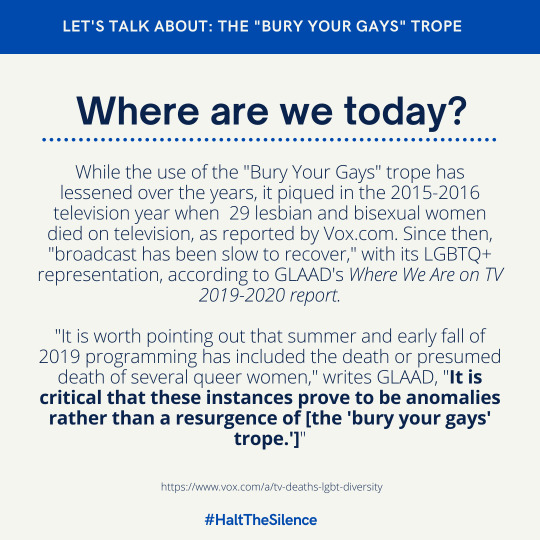
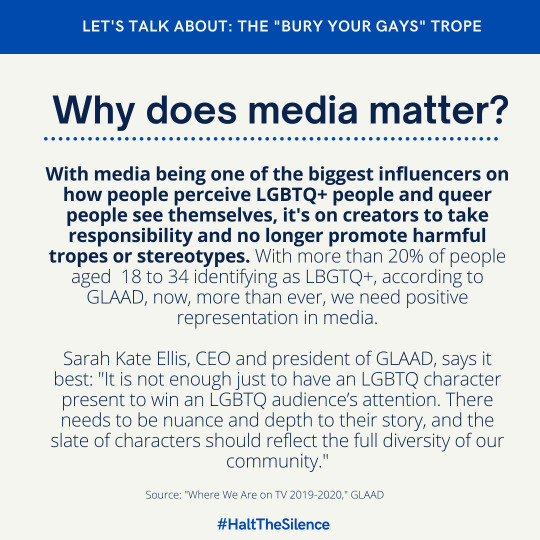
Let’s talk about the “Bury Your Gays” trope, a literary trope that became popular in the 19th century and persists to this day.
What is this Trope?
"Bury Your Gays" is a literary trope that became popular in the 19th century and persists to this day. What is this trope about? Overall, LGBTQ+ characters in media are more likely to die than their heterosexual counterparts. Often, the LGBTQ+ character's death occurs within mere pages or minutes after they have professed their love to a same-sex romantic partner.
It was originally known as the "Dead Lesbian Syndrome," due to the number of literary works that had lesbian characters dying by the end of their stories. In 2016, AutoStraddle compiled a list of 147 lesbian characters who died on television and film.
Why is this Trope Bad?
According to TVTropes.org, "Even when there is a perfectly valid narrative reason for the writers to chose to kill off the character ... it's often the case that killing one queer character is removing the only positive representation within the narrative."
With so few LGBTQ+ characters on TV (only around 10.2% of all characters on television, according to the Where We Are on TV 2019-2020 report from GLAAD) that means that those who look up to these characters as role models or inspiration often come to the conclusion that they are not allowed love or happiness.
Origins of the Trope
It was "originally used as a way for gay authors to write about gay characters without coming under fire for breaking laws and social mandates against the 'endorsement' of homosexuality," writes Haley Hulan of Grand Valley State University in her article Bury Your Gays: History, Usage, and Context.
"However," adds Hulan, "Bury Your Gays persists today in a time and social context in which it is no longer necessary to give gay characters and stories bad endings in order to be published."
History of the Trope
Early LGBTQ+ characters were framed in a negative manner or "punished" for their sexuality. This was due to laws that perceived homosexual relationships (especially between men) as "perverse." Any engagement in preserve acts was considered illegal for hundreds of years in the western world.
For many years, this was the only way LGBTQ+ characters could be featured in media, however. As Hulan writes, "any author who included positive portrayals of homosexuality in their work could result in an author being accused of 'endorsing' homosexuality," which could result in jail time or having their careers destroyed.
In the Film Industry
In the film industry, LGBTQ+ characters and relationships weren't allowed be seen on screen for many years or had to be portrayed in a negative manner. That was due to the Motion Picture Production Code, also known as the "Hays Code."
While LGBTQ+ characters were not explicitly forbidden by the code, according to the article Censoring the Movies — What was the 'Hays Code,' author Nathan Allen writes, "the rules about sex never mention homosexuality as a forbidden subject, but it was understood that the phrasing, '…pictures shall not infer that low forms of sex relationship are the accepted or common thing' meant no mention of gay love, sex, etc. in a positive light."
While society's attitude, and subsequent laws, about LGBTQ+ people and relationships have become more positive over the years, the "Bury Your Gays" trope is still prevalent. While LGBTQ+ characters are less likely to be portrayed negatively, their stories now often fall into the "Too Good for the Sinful World" narrative.
According to TVTropes.org, these are stories that "tackle the subject of homophobia and then depict LGBT characters as suffering victims who die tragic deaths from an uncaring world." Often, these deaths are "in service of another straight, cisgender character’s plot line," writes GLAAD in their Where We Are on TV 2017-2018 report.
Where are We Today?
While the use of the "Bury Your Gays" trope has lessened over the years, it piqued in the 2015-2016 television year when 29 lesbian and bisexual women died on television, as reported by Vox.com. Since then, "broadcast has been slow to recover," with its LGBTQ+ representation, according to GLAAD's Where We Are on TV 2019-2020 report.
"It is worth pointing out that summer and early fall of 2019 programming has included the death or presumed death of several queer women," writes GLAAD, "It is critical that these instances prove to be anomalies rather than a resurgence of [the 'bury your gays' trope.]"
Why Does Media Matter?
With media being one of the biggest influencers on how people perceive LGBTQ+ people and queer people see themselves, it's on creators to take responsibility and no longer promote harmful tropes or stereotypes. With more than 20% of people aged 18 to 34 identifying as LBGTQ+, according to GLAAD, now, more than ever, we need positive representation in media.
Sarah Kate Ellis, CEO and president of GLAAD, says it best: "It is not enough just to have an LGBTQ character present to win an LGBTQ audience’s attention. There needs to be nuance and depth to their story, and the slate of characters should reflect the full diversity of our community."
#lgbtq representation#lgbtq erasure#lgbtq media#bury your gays#history#halt the silence#haltthesilence
64 notes
·
View notes
Text
Feminist, Queer, Playboy, Philanthropist: Why Ironman Belongs to the Shes, Gays, and Theys
Introduction:
This material originally comes from a media critique project I did for an undergrad philosophy course and I've attempted to adapt it into a tumblr post that doesn't make your eyes bleed. I may or may not have been successful. Upfront, I'm giving you a trigger warning for discussion of sexual assault/rape. If you'd like to skip that part of the analysis, mind the red content warning [start/end].
Trix, what are you up to today? Well, I’d like to present an alternative narrative interpretation of the capstone of the MCU. At face value, Tony Stark shows us a wise-cracking, suave, and hyper-masculine superhero. His soundtrack is AC/DC and he arrives on the battlefield in a shower of gold sparks and hydraulics, wearing sunglasses that cost more than my uterus would fetch on the black market. However, this character presents us with so much more than just a hyper-masculine caricature of straight, cis heroism. Not only does he embody typically “feminine” film tropes—such as the hypersexualized “fighting-fucktoy” role, the policing of his body and promiscuity, and the climactic “rape scene” in which his predatory father-figure drugs him and steals his “heart”—additionally, he embodies classically queer film tropes. Unlike most male action-movie protagonists, his story line is an identity crisis at heart, culminating in a climactic “coming out” scene. His character is promiscuous and spurned for it, and camp is a constant underlying theme in his character design as a whole.
I explore these themes in two main parts: the femme and the queer. We'll start with the femme.
Hyper-Masculinity & Tony Stark
In order to understand the subversive nature of Tony Stark, we must first establish the typical nature of hyper-masculine and the hyper-feminine character tropes. Before we can ask the question, “how is this character coded as femme?'' We must first ask, “how is this character coded as masc?”. Further, what do these tropes tell the audience about those characters? Ultimately, the hypermasculine caricature lends power to the subject while the hyperfeminine caricature strips the subject of all agency.
Hypermasculinity is defined, generally, as the exaggerated portrayal or the reinforcement of “typically male stereotypes” (typical male meaning, in this context, that of a Westernized man) such as aggression, strength and power (both physcial and otherwise), as well as sex appeal, and integrity. Hypermasculinity takes a keen focus on the physical male form as a dominating force (1). A hypermasculine character, then, would be one that portrays a domineering, powerful man that is above his peers in some way, and is sexually desirable, in that he exemplifies a pornified picture of a male physique. This desirable and desiring caricature of manhood “socializes boys to believe that being a man means being powerful and in control” (2).
In contrast to this idea of hypermasculinity is the media’s typical portrayal of women. The typical hyperfeminine characterization of women in media is that of a passive, pretty, and overtly sexualized side-character with little agency or autonomy within the story. This is true of both blockbuster hits starring men and movies starring women, too. “We had many more interesting characters on screen in the '20s, '30s, '40s than we do now… They could be the femme fatale and then turn around and be the mother and then turn around and be the seductress, and then turn around and be the saint, and we accepted that. They were complex human beings” (2). This is no longer the case for a typical role for women on screen.
The documentary Miss Representation (2) presents a common caricature that a woman in Hollywood might find herself portraying. Action movies with a female lead surely must exhibit agency in their own story lines. However, the female-action-movie-lead is dubbed the “fighting fucktoy” by Miss Representation. Although she makes her own decisions and it is her narrative that drives the story, she primarily exists as eye-candy. Thus, even the “fighting fucktoy” is just that to audiences--a “fucktoy”. She may be “strong” but primarily, she must be pretty. The MCU character Black Widow perfectly exemplifies the “fighting fucktoy”. Her physical strength may be unquestioned, but primarily it is her beauty that is the focus on-screen. Never do we see her fighting in a t-shirt and sweatpants. Even outside of the skin-tight deep-vee catsuit, Black Widow’s plain clothes outfits consist of tight jeans and even tighter shirts.
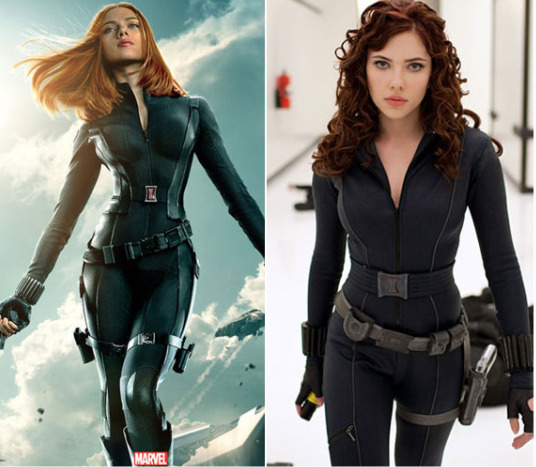
This is true for both hyperfeminine and hypermasculine stories. Both the men and women starring in mainstream productions are expected to exemplify a western ideal of peak beauty standards at all times. However, where the hypersexualization of male’s bodies is associated with power, dominance, and strength, the sexualization of women’s bodies is linked to submission, frailty, and possession. Hence the name, “fighting fucktoy”. Her beauty does not make her powerful, it makes her a “toy”, an object, a possession. The sexualization of men in media gives them power within their narratives. For women, it does the complete opposite. It makes them objects, even when they are strong. Beauty and sex make them the victims of their own stories. Ultimately, the hypermasculine male character is envied and emulated, not coveted.
Ironman: Femme Fatale
The storyline of the first Iron Man movie is one concerned with bodily autonomy in a way typically reserved for women--Tony Stark is presented as a fighting fucktoy with an unattainable heart. Not only that, he must struggle against the literal policing of his body by friends, family, and government agencies alike. This subversive, unexpected feminine story culminates in the pinnacle “rape scene” wherein a trusted older-male drugs and assaults Tony in order to take advantage of his “body”, the arc-reactor.

Let’s examine Tony’s coded “fighting fucktoy” persona in two parts: the “fighting” and the “fucktoy”. Miss Representation identifies what female leadership often looks like in movies. “When it comes to female leaders in entertainment media, we see the bitchy boss who has sacrificed family and love to make it to where she is” (2). Odd as it may seem, this perfectly encapsulates the metaphorical role of the arc reactor powering the Iron Man suits. First and foremost, the reactor represents Tony Stark’s heart. Not only is it literally located within his heart for the purpose of keeping it intact, it represents his rebirth as a caring, philanthropic man--it encapsulates Stark’s “fight”. Before his kidnapping and the subsequent implanting of the reactor, Stark was every inch the “bitchy boss who has sacrificed family and love” as well as morals themselves in order to be a war profiteer. His “fight” consists of standing up against the same system that had allowed him to amass his fortune. This “fight” is inextricably tied to his “bitchy boss” caricature as someone who has had to surrender love.
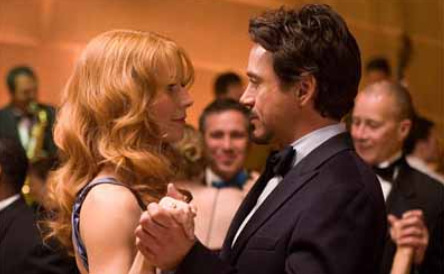
It is clear to the viewer that Stark has had to sacrifice love to get where he is in life. Many allusions are given towards the “will they won't they” nature of his relationship with Pepper Potts and Stark’s work is identified as the reason why they won’t. At the end of the movie, Stark attempts to seduce Potts, asking if she ever “thinks about that night” to which she replies, “Are you talking about the night that we danced and went up on the roof, and then you went downstairs to get me a drink, and you left me there, by myself?” The viewers are aware that the reason Stark ran off was because he had received news that Stark weapons had gotten into the wrong hands. Later, Potts will gift him the original arc reactor with the engraving: PROOF THAT TONY STARK HAS A HEART surrounding it. In an unconventional way, Stark portrays the frigid boss who sacrificed everything to get where she is in his titular fight against a war profiteering machine.
Next, let’s examine his role as the fucktoy. This is a more subtle theme throughout the film, present in body language and subtext. I will focus mainly on scenes which present a femme-coded sexualization--scenes where emphasis on Stark’s body does not lend Stark power, but instead strips him of his autonomy. Take for example the scene pictured below. In this scene, Stark bares his chest to Stane. He is quick to cover up and fruitlessly attempts to redirect Stane’s curiosity. Much like a scene where an attractive woman shows skin, the emphasis is placed on Stark redirecting Stane’s predatory interest. Notice the tension in Stark’s stance, the challenge in his eyes and the contrasting pose of Stane, mid-motion, pushing so close into Stark’s space. Stane is clearly coded as the aggressor once the reactor comes out. The same effect is observed as when a woman bares skin--an apparent loss of autonomy as other characters (and even the cinematography itself) takes a pornographic view of her body. Instead of a powerful male character baring his chest in the heat of a battle, giving the audience a glimpse of corded muscle and strength, this scene leaves the viewer feeling uncomfortable on Stark’s behalf.
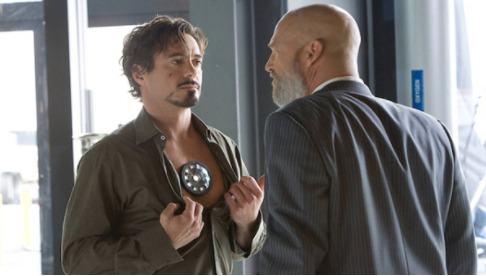
[TW Start] This femme-coded sexualization that leads ultimately to a loss of autonomy again rears its head in the titular “rape scene”. This is the clearest instance of the reactor--a literal part of Stark’s body, symbolically present as his heart--lends itself to his victimization. Just as a hypersexualized female character with no bodily autonomy, Stark’s bodily autonomy is forcefully violated so that a powerful male figure in his life can exploit a part of him. This theme becomes horrifyingly clear when the scene is examined up close.

Notice the position of their bodies. Once again, Stane towers over Stark, pressing into his space on all sides. In the first image, to the right, he has an arm draped over the back of the couch--a parody of a romantic or perhaps affectionate gesture from one intimate partner to another. Stane visibly radiates power in this position, even if the viewer were unaware of Stark’s paralyzed state. Stane’s shoulders are squared, even sitting down. The position of the reactor in his hand is relaxed and undeniably taunting. Looking at Stark himself, the horror and powerlessness of his situation is clear. His eyes are open, but almost appear to be unseeing. He is not looking directly at the reactor nor at Stane. In fact, it seems as though his eyes are looking below the reactor and to the room at large. I can only describe his expression as hollow--the blank eyes fixed out to something the viewers cannot see, his mouth partially open, his skin sickly pale.
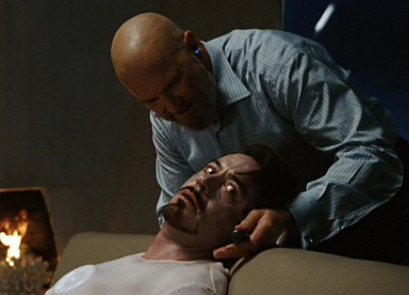
In the second image, pictured above, Stane leers over Stark’s body, cradling his head in, once again, a parody of a lover’s tenderness. He coaxes Stark’s now limp form down onto the couch, having just paralyzed him with a fictional, technological nerve agent. The horror is shockingly clear on Stark’s face and the perverse joy is just as clear on Stane’s. This scene itself is an undeniable parody of rape, or, at the very least, physical assault. [TW End]
Tony Stark presents us with a clear, femme-coded character as his story line draws upon classicly feminine tropes wherein the sexualization of the character’s body is exploitative at heart and leaves them vulnerable to physical predation. In this way, though he is strong, his “body” makes him the victim of his own story. Not only that, his character arc itself travels from the heart-less profiteer to the philanthropic man with a heart of gold, drawing upon another classically femme-caricature of the “bitchy boss”.
Queer Tropes & The Closet
Queer tropes are much harder to draw upon than that of feminine tropes. Queer tropes in film developed in a time of great censorship and as a result are often subtle. There are three main tropes I would like to reference for the purposes of this critique. Within the Iron Man franchise, there exists a distinct sense of camp, a problematized sexual promiscuity, and, ultimately, an identity-reveal/coming out storyline.
One of the most obvious of these tropes is camp. Camp is “defined as the purposeful and ironic adoption of stylistic elements that would otherwise be considered bad taste. Camp aesthetics are generally extreme, exaggerated and showy and always involve an element of mockery” (3). Camp is present in queer culture most commonly in the ball and drag scenes. Camp is the gaudy, the glitzy, the over-the-top, the classic-but-not, the in-your-face… Camp is all of the above and more. This is why it is so easily recognizable to audiences.
The Advocate identifies a series of seventeen queer caricatures in media for consideration, one of them being that of the “promiscuous queer”. Everyone knows the myth of the promiscuous bisexual, even when the reality is that bisexual individuals are no more or no less likely to view monogamy as “sacrificial” than gay or straight individuals (4). The stereotype of the promiscuous bisexual is inaccurate and harmful, and they are by no meals alone in being labeled overly promiscuous by a general audience. The “promiscuous queer” is defined as a character that may struggle with emotional intimacy and, as a result, sleeps around to mask the love they are missing in their life. “Films going back as far as the ’80s British period piece Another Country have featured gay male characters who use sex to cover for their inability to feel true intimacy with another human being” (5). Among their list of guilty perpetrators are Queer as Folk, The L Word, The Good Wife, and How to Get Away With Murder.
The last trope I’d like to present is that of the “coming out” story. Far from being problematic, the “coming out” is often necessary when telling a queer story. Coming out storylines can be problematized when they are presented as “Big Dark Secrets” that weigh heavily on a person until they are spoken. Ultimately, coming out is a choice. Many queer people choose to come out while many do not. There are many people who fall in between--some people may be comfortable being out to select individuals while not to others or to the world at large. In any case, people can be satisfied and fully fulfilled in any of those choices. Coming out stories are undeniably part of queer culture in media. Consider the recent hit, Love Simon alongside Transparent, Empire, Supergirl, and Glee.
Camp, Secrets & Sex
Through the camp of the Iron Man persona, the problematized sexuality of Stark, and the underlying theme of a “coming out” journey, Tony Stark presents audiences with a classically queer experience in film. Take the Iron Man suit itself. The iconic red and gold, the whine of the repulsors, the sleek metal edges and the furious glow of the arc reactor all scream camp. The red and the gold, the opening bars of Back In Black, the facial hair cut into odd spikes, and the sunglasses do, too. Each and every part of the Iron Man persona is camp. “Stylistic elements that otherwise would be bad taste”... talk about gold-plated biceps and a bright red, glowing chest piece! It's camp, baby!

The problematized sexuality of Stark is harder to see as reminiscent of a queer trope. Take, for example, one of the first scenes in the movie. “I do anything and everything that Mr. Stark requires, including, occasionally, taking out the trash”, Potts remarks in reference to a one-night stand she’s ushering out of Stark’s home. Here, Potts implies that Stark sleeps with “trash”. The following scene gives us the feeling that this is not a one-off occurrence. As Potts enters the room, Stark asks, “how’d she take it?” References to his repeated promiscuity are obvious. “Playboy” is an integral part of his persona. Equally obvious is Potts’ disapproval. Taking these inferences of his playboy lifestyle with what viewers know of Stark’s lack of attachments--his “bitchy boss” exterior, if you may--it appears as though his promiscuity is a symptom of the promiscuous queer stereotype.

“Don’t ever ask me to do anything like that ever again,” Potts says after removing the initial arc reactor model from Stark’s chest cavity. “I don’t have anyone but you,” Stark replies. The viewer has a clear picture of Stark as a playboy type who is truly lonely on the inside--who struggles with emotional intimacy. This struggle is evident, given that Potts, Stark’s secretary and co-worker, is the only person in his life he trusts to assist him in what is essentially open heart surgery. His playboy lifestyle mirrors the circumstances of the promiscuous queer trope in media.
Finally, we come to the last scene of the movie-- the climactic reveal. “I am Iron Man”, Stark says. This scene most clearly illustrates a queer story-line. Stark reveals his “identity”, shedding his last secret, and declares to reporters (and effectively the world) that he is Iron Man. To understand how this scene evokes such a strong sense of queer experience in viewers, I’d like to reference another recent in-universe identity reveal in the Marvel Cinematic canon. In Spiderman: Far From Home, the end-credit scene shows Peter Parker reacting in horror to his identity being leaked via doctored footage from the villain Mysterio. This scene can read as nothing but a deep violation. Even the main characters themselves react in abject horror at the news. The Spiderman identity reveal and the Iron Man identity reveal are two sides of the same coming-out process. In one, the character had full agency. In the other, the reveal was non-consensual, a complete violation. It is clear that both of these scenes draw explicitly upon themes that resonate particularly with queer audiences.
To Infinity(War) and Beyond
Growing up, I latched onto Iron Man and Tony Stark as an outlet for my “otherness”. I was well and truly obsessed with the character for reasons that I could not really put into words. He was weird, he was loud, and he was, frankly, unapologetic about any of it. I remember very clearly on my first day of tenth grade listening to Thunderstruck by AC/DC in the car and putting on the brightest shade of red lipstick I could find. Tony Stark gave me confidence. He gave me a voice. Throughout high-school I must have watched the first Iron Man movie upwards of twenty, maybe even thirty times. It was a comfort to me because it showed experiences I resonated with and it showed a strong character recovering from them. Tony Stark rose from the ashes every time and gave me the strength to rise from my own ashes every time he did.
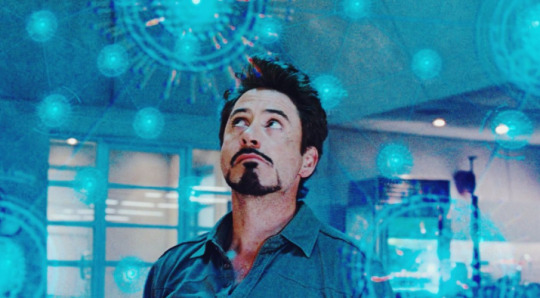
Our heroes can be anything. And Tony Stark was mine.
#thechestnuthead#here you go#yall asked for it#long post#really fucking long post#meta#trixree speaks#ironman#tony stark#marvel meta#analysis#this took a long time rip#if yall want the full paper you can hit me up for a PDF#my posts#trixree gets meta
24 notes
·
View notes
Text
Kylux and the Queer Literary Tradition

So, I have seen a lot of people talk about Kylux in terms of queer fetishisation or even labelling it a “crack ship”.
The discourse has somehow made Kylux out to be this straight-girl fantasy where two men are simply shipped because they are white and handsome. Such an unfavourable interpretation completely takes away from many Kyluxers being queer and/or poc themselves as well as shaming straight people for seeing queer potential where it’s not canonically stated to be. Since the comic came out, there has been much elation because it finally “confirms” some of the things that appeal to Kyluxers, therefore justifying the ship. I don’t think, however, that Kylux has ever been anything but rather conventional in its queer subtext. Kylux falls in line with a long tradition of homoerotic aggression between two men. I will try to put this into words as eloquently as I can.
First, let’s talk about how Kylo Ren/Ben Solo and Armitage Hux are queer coded on their own before moving on to their relationship.
Armitage Hux is almost comically queer coded. The act of feminising a villain to subtly convey to the audience that he is gay and therefore “morally reprehensible” has been a practice since the Hays code era (in some respects even before that -as the Victorian Age marks the beginning of our modern understanding of gender and subsequently, its subversion). He is seen to be physically weak, petty, moving and snarling and “bitching” in a way society would stereotypically ascribe to women.
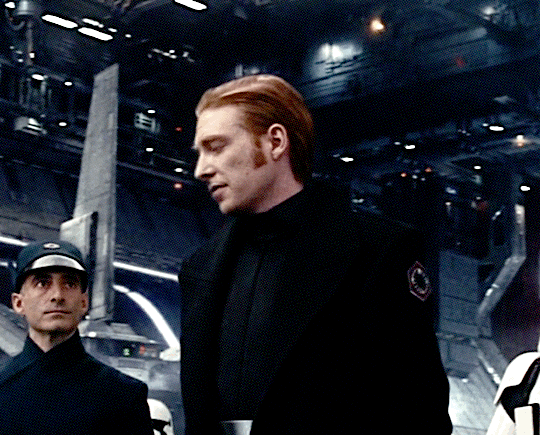
His British Accent, at least from an American point of view, already marks his sexuality as ambiguous. This is not helped by the fact that he speaks in an abnormally posh way, alienating himself from the common people.Hereby, the movies draw a well-established line between decadence/queer and pragmatic/heteronormative.
In the “Aftermath” trilogy Brendol Hux states his son to be “weak willed” and “thin as a slip of paper and just as useless”, robbing him of his masculinity – no matter how ridiculous of an endeavour this is when talking about a four-year old boy. Hux is very early on criticised for not fitting into a socially expected form of manhood. This is especially evident when one compares him to his resistance rival, Poe Dameron. Now, Dameron has his own set of queer coding, but he is shown to be what is commonly viewed as “acceptably queer”. He is masculine, trained and proactive. When he ridicules Hux at the beginning of The Last Jedi, there is this juxtaposition of the helpless, feminine villain and the dashing, superior male hero. Hux is supposed to be judged as vain and arrogant while Poe takes risks and although reckless, is somehow to be admired. Further, Hux is constantly abused. He is thrown into walls letting out high pitched screams, runs away in the face of danger (as seen in the recent comic) and is pushed around by his own subordinates. His strength lies in being cunning and calculated, not stereotypically masculine virtues.
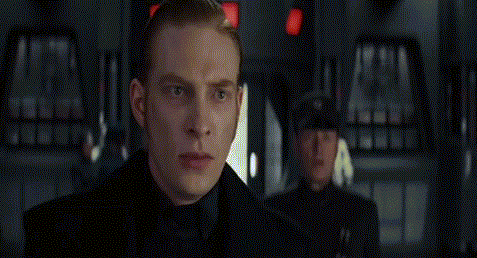
Hux’s destructive powers, his monstrosity so to speak, also follow a long-standing tradition of queer villainization. Harry Benshoff’s The Monster and The Homosexual articulates this as follows:
“[...] repressed by society, these socio-political and psychosexual Others are displaced (as in a nightmare) onto monstrous signifiers, in which form they return to wreak havoc […]” (Benshoff 65).
And what other, than a socio-political Other, is Armitage Hux - the Starkiller?
Kylo Ren/Ben Solo, too, is touched by the mark of queerness. It is no coincidence that despite his raw power and muscular physique, Kylo Ren has not been adopted by hegemonic masculinity in the same way Han Solo has, for example. When the logical is traditionally seen as masculine, the realms of pure and unfiltered emotionality is feminine. And Kylo Ren is unrestrained in his vulnerability, his tears, his pain – People make fun of the dramatic ways he gives words to his feelings precisely because it is regarded as weak, as whiny, as “womanly”. His long curly hair, full lips and dress-like costume only strengthens this impression. Kylo Ren is an amalgam of masculine aggression and feminine expressiveness. Some of his outbursts even remind of the pseudo-illness of hysteria. The gendered lines are blurred and unclear in Kylo Ren, diffusing any efforts to appease the binary. Benshoff describes this as a form of queer existence which does not only constitute itself in opposition to what is considered normal but “ultimately opposed the binary definitions and prescriptions of a patriarchal heterosexism” (Benshoff 63).
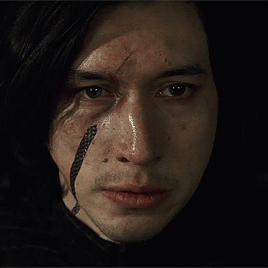
Both are not easily categorised. They are patched up by multiple, gendered signifyers. Kylo Ren’s masculine body in contrast to his femininized fashion. Hux’s slender body with his stiff and masculinised military get-up. Hux’s toxic tendency to avoid showing his emotions while also being shown as weak, womanly, cowardly. Kylo Ren is an excellent warrior, yet simultaneously being prone to emotional outbursts. Jeffrey Jerome Cohen’s famous work Monster Theory (Seven Theses) elaborates upon this further, while acknowledging that queer figures are most commonly depicted as the monstrous Other:
“The refusal to participate in the classificatory “order of things” is true of monsters generally: they are disturbing hybrids whose externally incoherent bodies resist attempts to include them in any systematic structuration.” (Cohen 6).
Nonetheless, many queer people feel empowered by these figures. Lee Edelman theorises in his polemic No Future: Queer Theory and the Death Drive about the nature of queerness as a force of cultural resistance. According to Edelman, the queer must always refuse societal expectations of a perpetual future and embrace the death drive instead. In this sense, queerness stands in direct opposition to futurity as it negates any meaning in sexual reproduction and marriage (cp. Edelman 13). When Hux destroys planets, when Kylo Ren proposes to burn it all down “The Empire, your Parents, the Resistance, the Sith, the Jedi”, they are not merely killing the past. They are also negating the worth of categories that make up future and present alike. They are resisting the heteronormative values of production.

Now that we have the puzzle pieces that illustrate how Hux and Kylo are queer figures in on themselves, it might be interesting to examine how they work together.
In her text “Epistemology of the Closet”, Eve Sedgwick talks about a common gothic trope where two men are caught in a feud full of mutual hatred. In this case, both men are mirror images of one another, making them especially vulnerable to the other’s advances: "[…] a male hero is in a close, usually murderous relation to another male figure, in some respects his 'double', to whom he seems to be mentally transparent."
Kylo and Hux are very clearly mirrors of one another. Aside from the gendered oppositions I have already illustrated, they are each other’s double in every sense of the word. Born on opposite ends of an age-old war. Both caught in complicated relationship with their fathers whom both have killed out of opposite motivations (loving them too much vs. hating them with a passion). They represent the opposite ends in the binaries for logic vs. spirituality, restraint vs. wildness, control vs. sensuality, technology vs. nature etc.
This shot from The Last Jedi shows both of them mirroring each other visually, henceforth strengthening this impression.
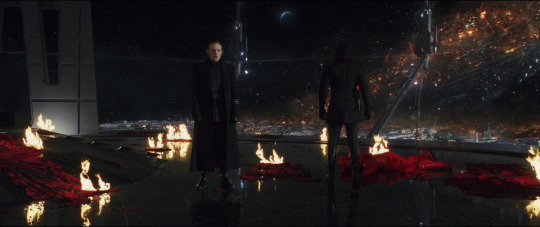
They are "mentally transparent" to each other, because they are different sides of the same coin which Snoke tossed around to his whims. Even their aggression takes on erotic forms. It is hard to deny the homoerotic implications in choking another men to make him submit, forcing him onto his knees. The breaching of personal spaces and looming over each other, the obsessive need to prove one’s own worth to the male other with which one is engaged in a homosocial bond:
“The projective mutual accusation of two mirror-image men, drawn together in a bond that renders desire indistinguishable from prédation, is the typifying gesture of paranoid knowledge.” (Sedgwick 100).
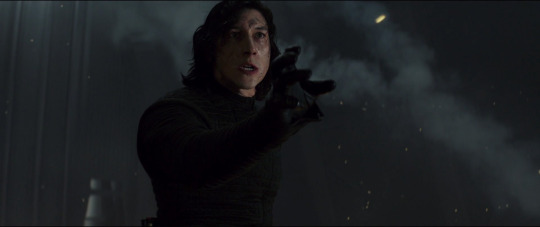

And through all of this, I have not even talked about the collaborative potential between the two of them. Their instinct to protect one another despite insiting the opposite. How both of them could overcome their trauma by engaging with the other, who suffered so similarly under family obligation and Snoke’s abuse.

Works Cited:
Benshoff, Harry: “The Monster and the Homosexual.” In: Harry Benshoff (ed. and introd.)/Sean Griffin (ed. and introd.): Queer Cinema, the Film Reader. New York: Routledge 2004. Pp. 63-74.
Cohen, Jeffrey Jerome. "Monster Culture (Seven Theses)." Jeffrey Jerome (ed. and preface) Cohen: Monster Theory: Reading Culture (1996): 3-25.
Edelman, Lee. No Future: Queer Theory and the Death Drive. ,2004. Print.
Sedgwick, Eve Kosofsky-Sedgwick. Epistemology Of the Closet. Berkeley, Calif. :University of California Press, 2008.
#Kylux#Armitage Hux#Kylo Ren#Ben Solo#General Hux#Hux#Benarmie#Kylux meta#sw#sw meta#sw analysis#tfa#tlj#long post#long text#hux comic#huxlo
2K notes
·
View notes
Text
Alex's IT character essay
Im here to talk about how the new movies did the losers dirty
we’re gonna start with the Core four lets go
The first loser I want to adress is Bill, in the book bill is a kind friend and a good leader, encouraging his friends to be brave and giving up at nothing to avenge his baby brother, When he’s young he ventures on his own even when scared, he also cusses out It with no remorse, as an adult he’s determind to defeat IT once and for all, he also treats his wife audra with love and respect, her capture by IT helping further motivate him to defeat it.’
The movie doesnt change much about child bill besides his motivation, he wants to find out what happened to georgie, and he does. Adulthood is where they screwed up with Bill, He’s disrespectful to Audra, is rude to Mike and yells at eddie despite supposedly being Eddies best friend and knowing how he reacts in scary situations. This is something bill would have never done in the book, he would have encouraged eddie to be brave and tell him that its alright to be scared.
Next is Eddie, In the book Eddie, while scared easily, will do anything for bill and is the only one able to lead them through the tunnels, he’s their compass and medic, patching the others up and leading them. He even uses his supposed medical conditions to his advantage, spraying It in the face with his inhaler, believing it to be battery acid it damages the clown.
The movie takes out a lot of eddie's important scenes, including the hospital where he sees his mom yell at his friends even while he sleeps, he’s not as determind to help bill and is more hyperactive and angry than he is in the book, though this movie is more accurate with myra than in the mini series, they did change his occupation which didnt make much sense to me. Being a driver in the book alluded to his role as having natural affinity towards directions in the book.
The third member of the Core Four is Stan, in the book stan is richies best friend, having an odd sense of humor and switching between being the other boys’ common sense and incouraging him. while it takes him the longest to truely beleive in IT hes the only loser to never truely forget. He’s a boyscout with a hyperfixation on birds that he uses to ground himself when IT traps him in the standpipe.
The movie changes his character in a couple of drastic ways though not as bad as bill. They make him more sarcastic, putting up with richies antics less. they change his fear compleatly which doesnt really make sense, they didnt really have a need to do this. they also took away his hyperfixation and changed how intensly his family participated in judaism and I feel this affected his character. They also didnt touch on how he is the only loser who left to never truly forget, the book mentions how sometimes he would mutter about maturin or say things relating to IT that would scare patty. I do like how they handled his death more in this movie than in the book. The letter I feel gave his death more meaning than it had in the book.
The final member of the Core Four is Richie. In the book he does funny voice impressions (though they werent very good) and did his best to keep his friends spirits high. He’s also one of the only two losers who were able to see how IT arrived on earth. He was vitally important in the final battle because part of the ritual of Chud is telling jokes and he could tell that Bill needed help in the final battle so he went into the deadlights to help his friend defeat IT and incourage him. He also accidently stole the irish cops voice in his assistance of bill.
The movie virtually erases his character, taking out about 90% of his scenes and making him purely trashmouth, the second movie wasnt much better, vocusing on his sexuality which they didnt have to do. They made richies friends alot ruder to him than they were in the book and thats not fair.
Now that we’re done with the core four Im going to adress the losers in order inwhich they joined the group, starting with Ben. In the book ben is there architect, naturally knowing how to build the dam that starts the begining of their group and later helping build and instructing on how to build their clubhouse, their safe haven from the cruelty of IT and Derry and allowing Mike and Richie to see how IT came to earth.
In the movie he still builds the clubhouse but his main personality traits are “history nerd” and “loves beverly.” they gave Ben mikes job of historian and just ignored bens help in bringing the club together. Ben is the catalist for the losers club forming.
Next to join is beverly. Im not gonna lie I like how they do beverly in the movie. of the losers shes probably the one closest to how she is in the book. They still screwed up a bit though. for starters she mainly only interacts with bill and ben not the other losers. They also killed her mom which I dont like, her mom was gentle and kind to bev helping deflect her fathers rath. they took that from her.
The last, but no less important, loser i want to discuss is Mike. In the Book hes the historian and light house, He’s the character that puts the most research into It even in adult hood and he brings the others back home. He calmly explaines to them what must be done and the others trust him.
The movies took away his job of historian and made him frantic as an adult, the others don't trust him like they do in the book. Also he fucking drugs bill which is something he never would have fucking done. He’s calm and gentle and the others listen to and trust him.
My final point: the most accurate character in these movies was the clown. and I dont understand why they couldnt just stay truer to the book. Maybe do something with how heavily queer coded eddie is instead of making being gay richis character ark. come on guys I know you can do better.
10 notes
·
View notes
Text
Steven Universe’s Representation and Music: an informal essay
As the first animated Cartoon Network show created entirely by a woman, Steven Universe’s run lasted for five seasons, a movie and a sequel-epilogue series. The show was far from perfect and its fandom wasn’t the best either but there is something so special about a show that followed lesbian space rocks and a young boy saving the world.
More specifically Steven Universe is about a young boy named Steven, who is half-Gem, half-human who protects the town of Beach City from evil. Gems are a kind of alien who take on the form of pastel-coloured women, to better assimilate with the rest of the world.
Rebecca Sugar, the creator, explains her colourful characters in a behind-the-scenes promo:
“I always dreamed of making a show that would have this mix of fantasy and reality. So, I wanted to make these fantasy characters that enjoy being with Steven as much, if not more than they enjoy being fantasy characters. The characters aren’t perfect and that’s what makes them so great.”
Steven’s family are known as the Crystal Gems, a group of rebels who fought against their government thousands of years ago and now live on earth. Steven’s mom, Rose Quartz was at the forefront of the fight, she did extremely terrible things and when she gave up her gem—-so Steven could be born—-she was left unable to form a body ever again. Steven, with only his dad and three alien women, must attempt to fix her messes and deal with the repercussions of his mother’s actions.
One of the main mechanics within the series is known as fusion, in which two or more Gems become a single being who is stronger and more powerful. The fused form takes on the physical, mental and emotional aspects of those who are part of the bond. As mentioned and discussed many times within this blog, fusions are a physical embodiment of different kinds of relationships. And for a show starring a primarily female cast, they do not shy away from using this mechanic to tell queer stories.
So explicitly that in 2018, the show had the first-ever lesbian wedding in a cartoon. Of course, representation wasn’t always as accepted in Steven Universe. Just two years before the big wedding, higher-ups at Cartoon Network told Rebecca Sugar, they not happy with the multiple queer relationships, so much so that they were ready to threaten cancellation.
In an interview with Entertainment Weekly, she expressed:
“If this is going to cost me my show that’s fine because this is a huge injustice and I need to be able to represent myself and my team through this show and anything less would be unfair to my audience.”
Being LGBT herself, identifying as bisexual and non-binary, representation is important to her. For many queer people, especially grown-ups, they hope to see themselves represented in kids’ media today as they never had growing up. They want nothing more for children’s shows to say that being “different” or not fitting in with our heteronormative society is actually normal.
Within Steven Universe, you can find woman-loving-woman relationships, non-binary and intersex characters, woman-loving-non-binary relationships, asexual coded characters and basically every other letter in the acronym.
Rebecca Sugar even acted as the exciting force for LGBT inclusion within Adventure Time, originally working as a writer and storyboard artist before leaving to create her own show. She pushed for making the ex-romantic queer couple to be canonically part of the story and for it to not just coded into the dialogue.
A few years later, she returned to the show, multiple times, to compose over 20 songs that would air over the series 10-year-long run such as, “I’m Just Your Problem” which had lesbian subtext that would be confirmed later.
Some other iconic songs including “Fry Song“, “Remember You“, “Good Little Girl“, “Everything Stays” and even the finale song, “Time Adventure“.
Much like the show as a whole, there is something so special about the music she writes. In total, there were over 160 songs written for the franchise, some being short little tunes, no longer than a minute while others were full-blown musical numbers. No matter, all of them have their place within the show. Often when the character can’t express lines through speech, music is utilized to provide a more raw and poignant portrayal of their emotions.
Why Steven Universe is so widely loved is due to the music, as the overall story is not even close to perfect. Yet, everyone can agree on one thing, the music is unbelievably good. What is interesting is the different styles of melodies and backtracking used in the various songs, even more impressive is that every character has their own instrumental motif.
Steven’s motif is the ukelele as he is often seen playing the instrument himself, performing short little melodies and even writing the in-show version of the theme song. Additionally, Steven’s music uses a large amount of Chiptune synth, electronic music which is created using a programmable sound generator. Both instruments have a very childlike feeling to them, Chiptune especially as it is normally used in video game music like The Legend of Zelda: Ocarina of Time, one of the main musical inspirations for the show. As Steven is the lead, most of the music has Chiptune somewhere in the score and fun fact, the first song in the show, sung by Steven, “Cookie Cat” was actually written on an old Gameboy.
Amethyst is very loud and fun, her motif is electric drums which is extremely reflective of her character. As she can be angry from convincing herself that she is not good enough to happy and giggling from pranking Steven, her instrument can be used in so many ways as she is not a simple character. No matter what, for the few songs Amethyst has on her own (or in the score), her drums provide such an interesting emotional response to the situation.
Garnet is a fusion, so her motif is actually the combination of two instruments. Ruby is a drumbeat as she is a fiery and loud character, she is chaotic while Sapphire is her opposite. Sapphire is calm and collected, she has ice-related powers and is represented by Synth music. The characters together have a perfect unity, expressed by Garnet’s synth bass sounds, she is the equilibrium of two very contrasting characters. The music associated with Garnet, uses primarily the synth bass but Ruby and Sapphire’s individual instruments can be heard throughout her music. All three instruments are also heavily representative as Garnet’s main dancing style is Hip Hop which clashing with others’ softer dancing styles.
Despite, not being alive during the show, Rose Quartz still has her own musical motif as she plays a large part in Steven’s growth throughout the series. As well as being in many flashbacks, she is represented with strings, more specifically, the violin. Rose’s story is rather sad which quite is visible within her associated music, yet, she was also an extremely powerful character as she led the fight against the Homeworld government. Her strength can be heard with strong uplifts and swells in the music. She is never seen playing an instrument unlike the rest of the main characters but one person who plays hers is Pearl, a character Rose was possibly in love with.
For the complex and beautiful character, Pearl, her motif is classical and swing piano. She is visually represented as a ballerina for a large majority of the series, dressed in a leotard, a small skirt and ballet shoes. Apart from Garnet, she is one of the calmest characters in the show. She is a perfectionist and is knowledgeable on many topics. She has a dark past and her fair share of trauma, all of this is wrapped up in her music. From her traumatic past with Rose Quartz, the violin had been heard throughout her music, yet, when she finally dealt with everything, the violin was lost. Swapped out for a new instrument, a bass guitar which she learned how to play at the end of the series. Pearl is a character who has been through a lot and her music reflects it. As she grew, her music changed with her, becoming her own instead of something built off of Rose’s.
My personal favourite song is “It’s Over Isn’t It?” which is this heartwrenching and emotionally painful ballad sung by a broken woman. Pearl was in love with Steven’s mom. Yet, the feelings were not mutual or at least ended being reciprocated as Rose left her for Greg, Steven’s dad. It hurts because Rose didn’t just leave her, Rose Quartz also passed away. As the song goes:
That they didn’t really matter until you
I was fine when you came
And we fought like it was all some silly game
Over her, who she’d choose
After all those years, I never thought I’d lose
…
You won and she chose you and she loved you and she’s gone
It’s over, isn’t it?
Why can’t I move on?
…
Who am I now in this world without her?
Petty and dull with the nerve to doubt her
What does it matter? It’s already done
Now I’ve got to be there for her son
Without Rose, Pearl has lost her place in the world as all she ever knew was her. Yet, now she is left to help raise a half-human baby and go on with her life. It makes it more difficult as this baby is the product of Rose and the man that she left Pearl for.
Pearl doesn’t want to hate Greg, she is angry at him but she doesn’t have hatred towards him. They may not be the best of pals at the start of the series but in the song called “Both of You“ has Steven, finally, begging for Greg and Pearl to just talk to each other.
Why don’t you talk to each other?
Why don’t you talk to each other?
Just give it a try
Why don’t you talk about what happened?
…
You might not believe it but you got a lot in common, you really do
You both love me and I love both of you
…
I know you both need it
Someone who knows what you’re going through
An interesting thing about this song is that Steven is this to them, the person with Rose’s gem is singing to the two people who fought over Rose. It makes me wonder if this could be Rose speaking through Steven to her two loved ones. Whether it is or not, doesn’t really matter to the overall story but it is a fun idea to look at.
Overall, these songs are a literal representation of dealing with ones’ emotions in a healthy way, something that Steven Universe actively tries to teach their younger viewers about.
To say Steven Universe is a good show only for its music would be a false statement, it’s one of the strongest aspects but without the story or the characters, the music would fall flat and not have any of its passion.
#isaac rambles#steven universe#lgbt#steven universe music#cartoons#cartoon network#rebecca sugar#cartoon review
2 notes
·
View notes
Text
More Than Meets the Eye #12- Gay Rights: the Movie
Finally finished with our franchise obligations! Let’s get back to the main story.

Those are some ominous ellipses. Almost like something bad is going to happen!
Let’s take a look at Cover A for this issue.
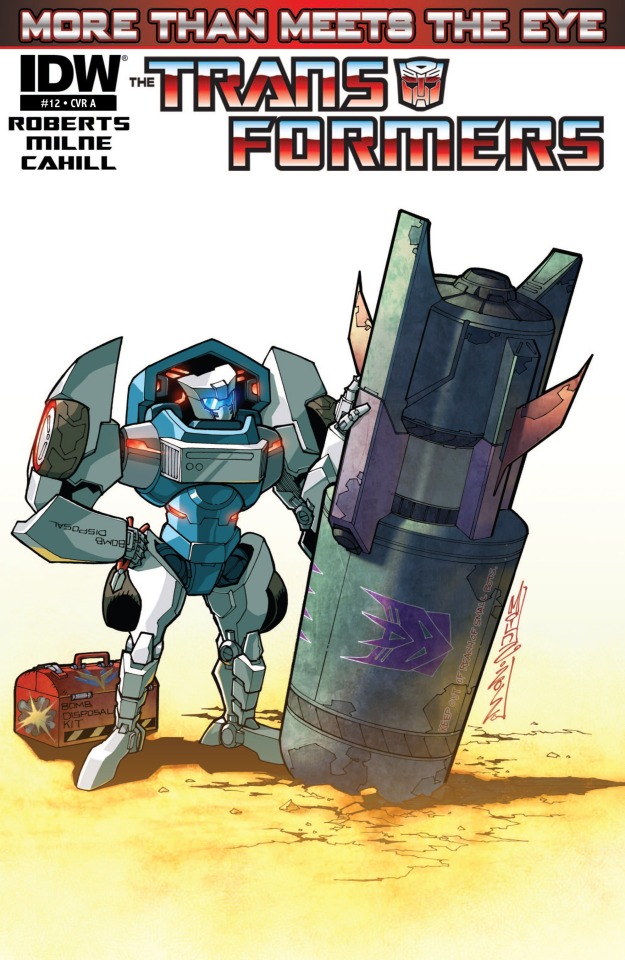
When this was released to the general public, alongside the synopsis that stated the Lost Lighters were going to run into a group of Decepticons, a lot of people thought we’d be seeing them meet the Scavengers. This isn’t the case, and that’s not Fulcrum. It’s some other K-Con, one that has purple in his color scheme.
Our story opens up with a narrative framing device:

Welcome to “Before & After”, one of the more ambitious issues of MTMTE in terms of storytelling. Roberts really likes bouncing between scenes and POVs, and he’s really indulging that here.
Rodimus and crew have loaded up on one of the Lost Light’s scouting ships to check in on a planet called Temptoria. Whirl’s leading all the guys in the front in a war cry that wouldn’t be out of place in Hollywood’s version of the Vietnam war, while Brawn demonstrates how to not properly handle a gun. Rodimus tries to explain what exactly they’ll be doing, but no one’s listening, feeding off of the chaotic energy. The back seat isn’t quite as rowdy.

Oh, Ambulon’s here? That’s got to be awkward. And Perceptor’s looking mighty cross about having to pick up a gun again. Isn’t he supposed to be retired from being a science sniper?
Rodimus finally gets everyone to settle down long enough to explain the situation, though not without a little jargon mixup.
Basically, Ultra Magnus went down to Temptoria while the “Shadowplay” story was being told, and found out that the organic populace had been enslaved by a group of Decepticons, and, more importantly, the sovereign agreement that the planet had with Cybertron’s been violated. Also, these guys might have been the one’s who kidnapped the Circle of Light. You remember those guys, right? The guys who were supposed to be in the 2012 Annual, but they weren’t, and Drift got really mad about it.
Rodimus wraps up the briefing with a “’Til all are one!” And we cut over to see what Swerve and Tailgate are up to. Tailgate seems to be a little nervous, not the type to enjoy waiting, but Swerve seems to be doing just fine. Why is that, exactly?

Even if Rung’s still a steamed side dish of a vegetable, he’s still here, in a way. And good on Swerve for not assuming Tailgate can visualize in the same way he can. Aphantasia is more common than one might think.
Escapism is an interesting way of dealing with your problems, but I don’t know enough about wartime psychiatry to know if this is something that would actually be considered a viable solution or not.
Oh, now that I’ve said it, I’ve got the research itch.
Later, later.
Anyway, Tailgate gives it a spin, and his happy place is surprisingly domestic for such a seasoned professional.

Pipes, it’s a clear glass, it’s not hiding anything from you.
Speaking of Pipes, he’s seated next to Hound, as they discuss what happened to Red Alert. Or, rather, the cover story that’s been fed to the rest of the crew by Rodimus, which is that the engine room pretty much attacked him. This is how ghost stories get started.
Trailcutter’s gotten some guns installed in his legs, because he’s a hypocrite.
Over with Chromedome and Rewind, there’s trouble in paradise, as they’re having a lovers’ spat. Chromedome’s giving Rewind the silent treatment, and Rewind’s having none of it. What exactly are they fighting about? We don’t get to know about that yet, but it’s digging up other issues, like Chromedome going back on his promise to stop injecting. The only thing keeping this from becoming a total meltdown is Whirl can-canning through the door to kidnap Rewind, so he can film Whirl getting in the zone before the fight. Whirl’s having a great time. This is probably the first time they’ve gotten to fight something since the Lost Light took off, and he’s all about it.
Rewind’s dragged away, and Chromedome just lets it happen, because he’s feeling cross. It’s good to take a moment to cool off, but I’m not quite sure this was the best time or way for it to happen.
Meanwhile, on the Temptorian surface, Blip the Decepticon, who is likely the dirtiest son of a gun we’ve run into so far, is asked to take a look at the monitor by a guy who sounds exactly like Megatron. It doesn’t particularly matter which Megatron, because comics are not an audio-based medium, so you can pick whichever one you like best. What’s on the monitor does not please Blip in the slightest.
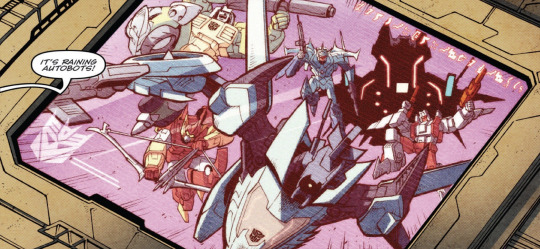
I feel like maybe having guys who don’t turn into flying machines jump out of the bottom of the shuttlecraft isn’t the greatest tactical thinking, but I’m sure everything will be okay. Brawn’s got a gun, maybe he’ll figure out how to rocket-jump before he hits terminal velocity.
Then the narrative jumps to after the fight, as the ship flies away from the scene, and Chromedome isn’t happy. It’s for a different reason than earlier, though.
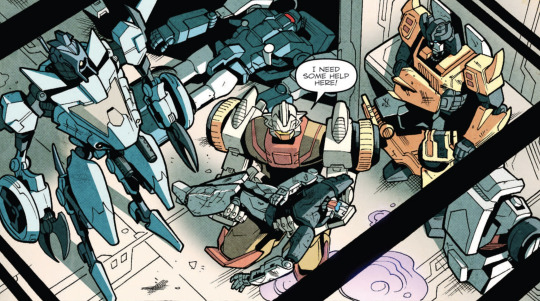
Man, Pipes just can’t win, can he?
Ambulon remembers that he is, in fact, a medical professional, and starts working on Rewind, while Chromedome tries to ask Swerve just what the hell happened. Swerve’s having his own issues, however.

I’d nearly forgotten they had skeletons.
On the production side of this issue, we’ve got two artists: there’s our usual guy, Alex Milne on the “Before” sections, and Brandon Cahill on the “After”. Cahill’s other Transformers work includes The Transformers (2009) and the sister series to MTMTE, Robots in Disguise. Outside of the franchise, he’s worked on several Marvel pieces, including writing Sable & Fortune and Legion of Monsters. Unlike a lot of the alternate artists we’ve seen for the series, Cahill won’t be a one-and-done; we’ll see his art again in Dark Cybertron, Season 2 of MTMTE, and even Lost Light.
Getting back to the story, we’ve jumped back to the point in the battle where everyone’s hit the ground and are just wailing on each other. Tailgate and Swerve watch the chaos unfold, as Ultra Magnus more or less takes on a platoon of Decepticons.
Drift’s having a great time, as he Naruto runs through the enemy, slashing as he goes with a big ol’ smile on his face. He stabs a guy in the back of the head who was trying to grapple with Rodimus, thus interrupting the little dialogue they had going on. Rodimus is vaguely upset that his moment was cut short.
In the “After”, the shuttle’s landed back on the Lost Light, and Chromedome rushes out with Rewind in his arms to find First Aid with a motorized stretcher. He was hoping for Ratchet- he wants only the best for his shnookums. As they run Rewind down to the medibay, Chromedome starts listing off his allergies- which include ultraviolet light, something we know reveals mnemosurgery scars. This is a holdover from a dropped plot point I’ll cover at a later time; as it stands in the canon narrative, Rewind’s just got an allergy to the friggin’ sun.
Back at the shuttle, Tailgate starts dragging Cyclonus down the gangplank. Oh, hell. You know it’s a bad situation when the guy who literally couldn’t die for six million years is out of commission.
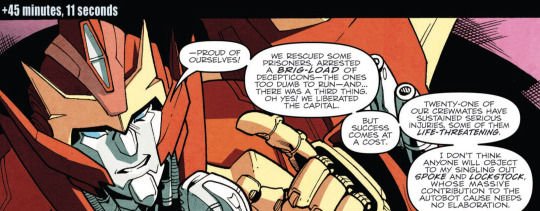
Spoke and Lockstock are a bit of a gag- they always manage to get their asses kicked, but everyone on the ship really likes them. They will never be seen on-panel, and have no character designs.
Over in the medibay, history is being made.
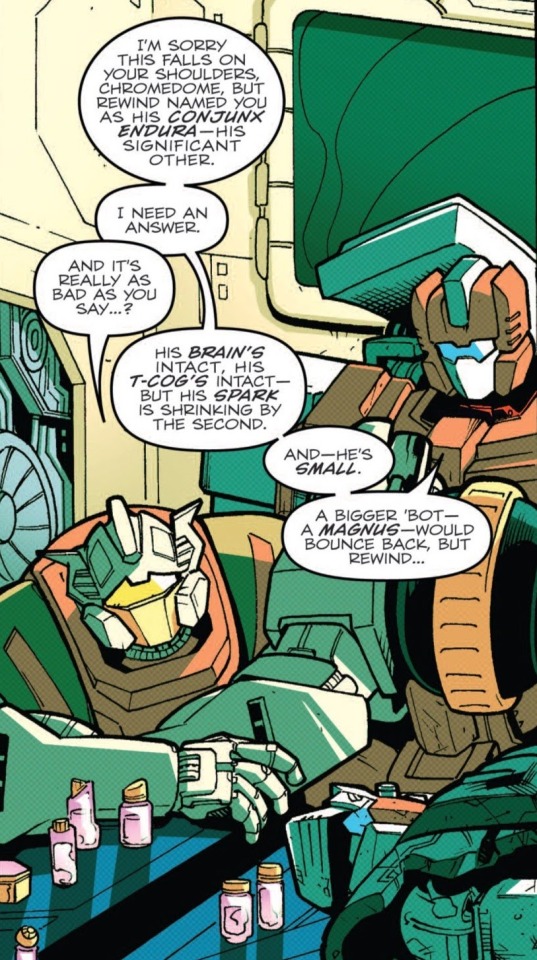
Esteemed members of the jury, I present to you: canon gay robots. The first in a long line of them. This is the starting point of the queer community being handed the Transformers franchise on a silver platter.
Up to this point, Roberts hadn’t gotten any further than implied attraction and affection between robots, in either his fanworks or professional credits. Pretty heavy-handed implication in some cases-



-but implication nonetheless. Here is the first, honest-to-god direct confirmation of two male-coded robots in love.
In love and space-married and recognized by the authority in power, in a comic written in 2012, as a part of a major franchise owned by a massive American company, three years before same-sex marriage would be legalized on a federal level.
As part of the story, it’s great. Within the context of the time during which it was published, it’s a whole other level. This wasn’t just good writing, it was important.
Let me part the kimono a little here, with some personal backstory- I grew up in Buttfuck Nowhere, NC, and went to a high school that was so homogeneous, they were threatening to bus students in after I graduated. I didn’t know what a gay person even was until I was 12. “Lesbian” was used as an insult, and it was one I was subjected to because I had cut my hair short in middle school and wore cargo shorts on occasion. It was something I really pushed against, because that’s how a lot of people react to being forcibly given a label.
Not the best environment for a little queer kid, clearly.
It wasn’t until well after I’d gone to college that I really started understanding who I was. Hell, I’m still figuring some things out, but at least I’m getting somewhere.
I remember reading this for the first time in 2015- yes, I got into the comics sort of late- and then having to reread it. I needed a moment just to process what had happened. As a person who had only recently come to terms with their sexuality at the time, it was kind of mind-blowing to have that sort of representation, especially since I was also watching Transformers Prime at around the same time. Talk about the duality of man, am I right?
These days, there’s a lot more representation in many different forms of media. Things are getting better. Which, y’know, yay! I’m glad. I just can’t help but wonder if things would have been a little different if this sort of representation had been available earlier on.
Anyway, so yes, Chromedome’s got a difficult choice to make for Rewind- either let his body try to sort itself out, or let First Aid break out the clamps and try to jumpstart him. Rewind’s got a relatively rare spark type, but luckily Chromedome’s the same type. Looks like everything’s coming up roses for our boys!
Tailgate and Cyclonus aren’t getting nearly as good a break.
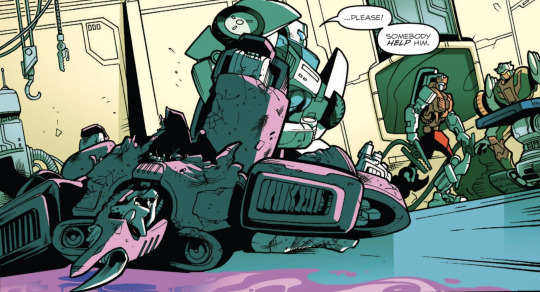
My god, he’s filled with grape soda!
Back in the “Before”, things are getting a little silly.

Chromedome, what POSSIBLE tactical advantage could you be gaining from riding the giant, fire-breathing robot dinosaur? This is why they threw you in Kimia, isn’t it? Because you’re a dumbass.
While this bullshit is happening, Rewind and Tailgate are stacked on top of each other to look through a window, because I guess that’s just how things turn out when the resident couple on the ship is upset with one another. Rewind’s found something, but it isn’t the Circle of Light. Rather, it seems the Decepticons are dabbling in Pink Alchemy- a rather inefficient process that allows organic creatures to be turned into energon for consumption.
The good guy thing to do would be to save all the organics, but there’s a bit of a problem- the door is wired to a massive bomb. Good thing Tailgate was in Bomb Disposal, and is just generally an impressive and well-established dude. He gets to work.

Getting back to a point I made during Chaos Theory, Whirl can’t make a fist. Punching himself in the face is probably more akin to slashing it.
Tailgate’s got a weird approach to bombs, taking the time to teach Rewind how to do it, by way of student-led learning. They decide to poke a hole in the bottom of the bomb to drain all the explosive fluid out, which Tailgate does with little robot tears streaming down his face. Fear is a great motivator.

Oof, not a “Domey” in sight. That’s how you know things are rough.
Outside of this little scene, Whirl and Cyclonus are handling Decepticons. Whirl’s got a hold on that guy who’s voiced by Frank Welker, and we get a nice shot of his sad cat face before Whirl turns his head into a memory.
Swerve- who is also here- asks Whirl to loan him a gun.
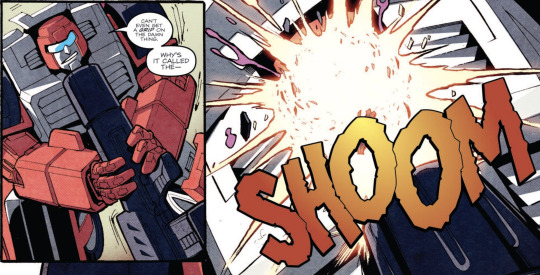
GODDAMMIT SWERVE.
Not a single one of you bastards know proper gun safety! Between all the severe depression and reckless weapon-handling, I genuinely have no idea how the hell are any of you are still alive.
In the “After”, Chromedome’s just finished jumpstarting Rewind, and it’ll take a bit to see if it worked, so he’s left alone with his thoughts.
Just kidding, Tailgate’s come over to check in. Seems like Cyclonus is gonna pull through, something Chromedome’s not terribly thrilled about. Chromedome’s still miffed about the whole Kimia thing.
We finally learn why Chromedome and Rewind were fighting; it was because Rewind, as a walking historical database, has been deemed too important to die, and can opt out of any fight he choose to, but he doesn’t, thereby putting himself in harm’s way unnecessarily. Maybe he just worries about you when you go out there on the battlefield alone, Chromedome, you ever think of that? Maybe he doesn’t want to wonder when his husband will return home from the war.
Tailgate asks about all the little vials that are scattered around Rewind’s hospital bed, and we get a little Cybertronian tradition thrown at us.
The vials are filled with innermost energon, the stuff that surrounds the spark casing and never changes, no matter how much you modify or upgrade your body. Leaving a little of the stuff for someone in an offering signifies that you care very much for that person. Chromedome can’t give Rewind any, because he was “born dry”, but I think being space-married to the guy more than makes up for it.
Tailgate asks how the two of them met, and unlike in issue #6, Chromedome is feeling vulnerable enough to indulge the question this time.
But first we need to establish that Chromedome is insanely insecure.
So, Rewind is fucking old. He’s older than the Cybertronian civil war, he’s older than the calendar system, and he’s old enough to have been affected by Functionist society’s categorization system. Due to being a memory stick- something that there were millions of back in the day- Ratioism dictated that Rewind as an individual was worth very little, and made him and his like into slaves. Because he was a slave, he needed a master, and that master was none other than Dominus Ambus, also known as Cybertron’s Mech of the Year for 40,000 consecutive years.

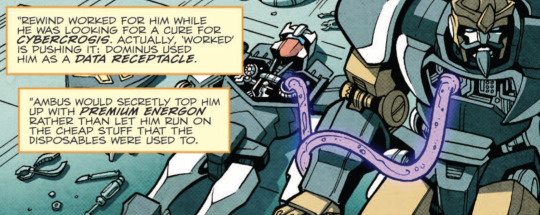
Even on Cybertron, there’s a weird stigma about breastfeeding.
Rewind and Dominus quickly became friends, because that’s just the sort of guy Rewind is, and it made Dominus realize that maybe these slaves Cybertron had been working to death were sentient creatures worthy of respect too. He even developed a test to prove that all the slave classes were on the same level of functionality as everyone else.
On their quest to find a cure for the horrible disease Cybercrosis, Rewind and Dominus fucked off into space, on a wild goose chase to try and find Luna 1, the Cybertronian moon that just disappeared one day. Weird, that. They didn’t find it, and by the time they’d come back home, the war was well underway. They immediately became Autobots, and that was it for a while.
Then we move on to how Chromedome and Rewind met, and boy is it a doozy.
Chromedome had decided he wanted to kill himself, so he moseyed on over to the nearest relinquishment clinic- they did assisted suicides instead of body-swaps at this point- to do the deed. He was sitting in the waiting room, when he heard someone screaming. He wandered into the back to find Rewind weeping over a coffin, and he thought to himself “Maybe I don’t need to die after all” as he offered his future conjunx a shoulder to cry on.
What a fucking dark start to a relationship.
Rewind wasn’t upset about anyone who was dead though, but rather missing- Dominus had disappeared into thin air months ago, and Rewind was getting desperate to find him, looking in more and more awful places in the hope of recovering what he’d lost.
As it turns out, he’s still doing that. The reason the two of them are on the Lost Light is because Rewind needs to find Dominus- alive or dead, it doesn’t seem to particularly matter at this point. That’s why he buys snuff films in dark alleys.

See, Tailgate gets it.

Guys, bad news.
Chromedome’s spark is too weak to jumpstart Rewind. Unless they find another compatible donor, Rewind’s gonna be in big trouble. There’s nothing to do but wait.
Later, in their room, Chromedome is sitting on the floor and very much not following doctor’s orders to get some sleep. Someone on the opposite side of the door he’s leaning up against starts talking to him. Chromedome doesn’t seem to want to hear any of it, until he does.
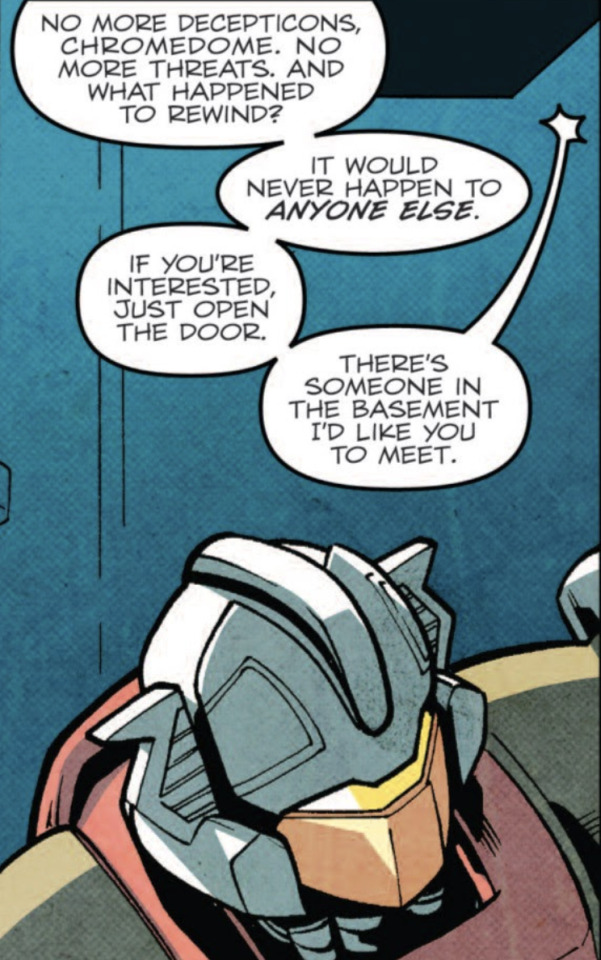
Given who the basement dweller is, this probably won’t turn out so hot.
Chromedome gets a call from the medibay, and fortunately the universe has decided to play nice this go around, because someone came forward as a match.

But it’s not like Whirl cares about anyone, right? Not in the slightest, nuh-uh, not him!
While Chromedome gives Whirl what is probably an uncomfortably long hug, and they both most likely ignore the fact that Chromedome would be actively suicidal without Rewind, Tailgate’s off in the corner, having taken his hand off and begun pouring cartoon toxic waste into a vial. It’s actually his innermost energon. Boy’s making an offering, but it isn’t to Rewind.
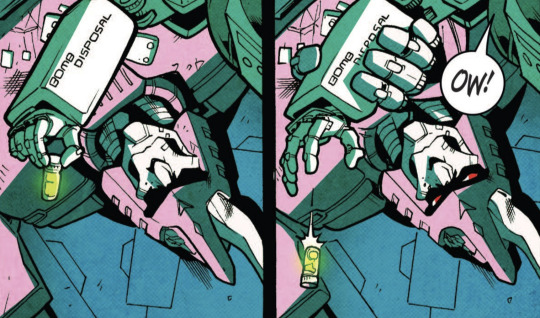
It’s to this ungrateful fuck.
Cyclonus stalks away from Tailgate’s kindness, until he’s stopped by witnessing the power of love.

Everyone likes Rewind, and these displays of affection seems to have reminded Cyclonus that he’s horrifically lonely. Feeling some remorse over his actions- not that he’ll ever admit it out loud- he goes back to help Tailgate pick up the pieces of the vial he broke.
Wrapping up our story, we go back to the “Before”, right before the bomb is set to go off. Whirl and Cyclonus have more or less taken care of the Decepticons, Whirl suggests they set aside their differences and agree to stop trying to murder each other, in a surprising show of reason and, perhaps, self-preservation. Cyclonus doesn’t seem to agree with the idea.

I genuinely think that’s the most he’s said all series up to this point.
Rewind calls the two idiots over for help, because Tailgate’s about to pull a self-sacrifice to get this bomb emptied, and he just isn’t listening to reason. Cyclonus assists.
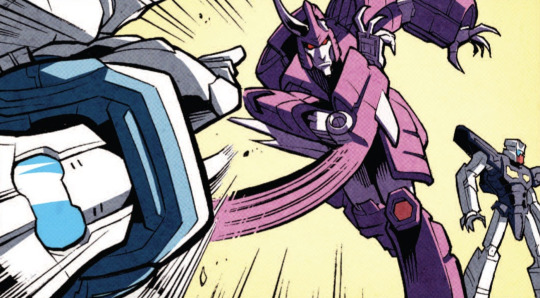
Once Tailgate’s been fastball-specialed out of the room, Whirl decides to get back to being a bastard, and locks Cyclonus and Rewind in with the bomb with 10 seconds left on the clock. Ah, so the donation was out of guilt, I see. Still a form of caring, in its own way.
With no way to escape, all Cyclonus can do is attempt to shield Rewind with his body as the bomb goes off.
That’s the end of the issue but it’s the middle of the story, and despite what Cyclonus says, dynamics are changing. Slowly, but surely, things are shifting. He’s headed for a lot of character development, and he’ll be kicking and screaming the whole way.
#transformers#jro#mtmte#issue 12#maccadam#Hannzreads#text post#long post#overthinking about robots#incoming analysis#comic script writing
45 notes
·
View notes
Text
She-Ra and the power of inherently queer stories
uploading my essay here for the anon who wanted it, theres definitely a lot more that I wouldve liked to cover if i wasnt page limited and rushing lol
On paper, queer representation in media is vastly improved from where it was just 5-10 years ago. In that time plenty of high-profile shows and movies have introduced at least one openly gay character. Although this is, relatively speaking, a massive step from where we were before, many of these feel like incredibly superficial depictions made by and for straight people to feel good about themselves (and to blow way out of proportion in marketing so that the gays will give you money, of course). Sure the character shows up, talks about his husband, and they might even kiss on screen if you’re really lucky. But all of this is done in such a way that it can be edited out for international markets without disrupting the flow of the film, because these characters being queer isn’t ultimately that important, and whoever’s in charge considers queer and straight characters to be interchangable. As a result, these depictions often fail to resonate with the queer people who need to see them most, lacking the nuance that comes with queer life.
One show that absolutely smashes this, however, is Noelle Stevenson’s She-Ra and the Princesses of Power (2018). A reboot of the classic (but incredibly dated) 1980s cartoon, She-ra at its core is the story of Adora and Catra, two childhood best friends who find themselves on opposite sides of a war and journey from love to hate and all the way back again before they realize their true feelings for eachother, saving their world (and themselves) in the process. To be clear, the show includes multiple unambiguously, canonically queer characters in its recurring cast from the beginning from a married lesbian couple to a genderfluid shapeshifter. But as Stevenson said in an interview reflecting on representation in the show, she wanted to focus on “Not just the very clear straight-forward, incidental representation but the more complex, subtle, nuanced stories that play out over time and reflect more aspects of ourselves other than just the right to get married. There's so much more wrapped into our experiences." This definitely shines through in the show. When Catra and Adora are growing up as child soldiers for the Horde, they form a deep emotional bond to protect eachother from Shadow Weaver, their emotionally abusive commander who serves as the only real parental figure that either of them have.
One thing that quickly became apparent in discussion surrounding the show was the different ways that people interpreted this situation depending on their own identities. Many cishet people read Catra and Adora as more like adoptive sisters at first (a fairly common misread of lesbian relationships in general), but for others it resonated as it was meant to: an allegory for the way that queer people find shelter in eachother even in situations where it’s dangerous to express themselves openly. Even though neither of them fully understand the depth of their feelings, over the course of the first episode alone we see both Catra and Adora put themself in harm’s way to protect the other multiple times, both willing to endure the abuse in order to see their goal of taking over together come to fruition. However, things change when Adora finds out that she’s the heir to a legendary power and deserts the Horde to join the rebellion, unable to convince Catra to leave with her. The tension between Adora’s guilt over leaving the only person she’s ever cared about and the resentment Catra feels for Adora’s perceived abandonment of her and everything they’ve worked for is the driving emotional conflict for basically the entire show.
While Adora is living in the capital city and growing into her new power, Shadow Weaver and others manipulate Catra’s feelings, convincing her that Adora abandoned her because it was convenient and never truly cared. She becomes convinced of this, slipping into resentment and self-hatred that was very familiar for me as a trans person (Catra is heavily trans-coded, but that would be a whole paper itself), and begins lashing out at both herself and anyone who tries to get close to her. However, she can never truly bring herself to hate Adora, and realizes that no amount of power will make her happy, but doesn’t believe that Adora could ever possibly share her feelings. By the time Horde Prime, the final villain of the show, arrives, Catra willingly submits herself to mind control in the hopes that it will take the pain away. Horde Prime is a fairly blatant stand in for homophobic religious leaders, and as such literally baptizes Catra into his hive mind, declaring that “all beings must suffer to become pure”, providing a very clear link to real life ‘conversion therapy’. Adora, however, refuses to give up, her feelings strong enough to literally revive a dead Catra after Prime kills her.
The thing that really cements She-Ra as both an explicitly and implicitly queer story, however, is its ending. These themes of emotional abuse and trauma, both familiar to many queer people, have been built expertly throughout the show, and in the end Catra finally confessing her feelings is what gives Adora the strength to save the planet (mirroring her love saving Catra a few episodes earlier). Ultimately, Adora and Catra both needed to overcome their own self destructive tendencies before they were able to be together rather than one of them waiting on the other to fix them (although the support certainly helps), subverting many of the harmful tropes typical to straight romances. As Stevenson says later in the same interview, “we didn’t know if we were going to be able to make it explicit, so In the meantime [we were] trying to build a framework into the very DNA of the show”. As paradoxical as it seems that the way to get around censorship is to make the show more queer, it makes a lot of sense. Even if Catra and Adora hadn’t kissed at the end and gotten their fairytale ending, it still would have been an undeniably queer story if you knew what to look for.
Ultimately, my hope is that the success of She-Ra and other shows like it will allow for a wider range of queer stories to reach screens. It’s been really hard for me to avoid turning this into a personal essay, because the show really hit me very hard during a very formative time in my life as I navigated my identity and struggled with a lot of similar feelings to the main characters, which is why its so important to me to analyze how it manages to resonate with that and explore what being queer means and how it affects all of your life.
Sources Cited:
https://www.papermag.com/rebecca-sugar-noelle-stevenson-2646446747.html
3 notes
·
View notes
Link
Chapters: 3/5
Fandom: Zoey's Extraordinary Playlist (TV)
Rating: Mature
Warnings: No Archive Warnings Apply
Relationships: Zoey Clarke/Joan
Characters: Zoey Clarke, Joan (Zoey’s Extraordinary Playlist)
Additional Tags: it's the headcannon fic!, your #2 choice, two people start having sex for fun and oops they're in love, Women Loving Women, Developing Relationship, Boss/Employee Relationship, Bisexual Female Character, joan's pov, so I wouldn't have to deal with songs, Lesbian Sex, Fluff and Smut, Vaginal Fingering, Cunnilingus, Cuddling & Snuggling, Post-Coital Cuddling, From Sex to Love, Sex Toys, Bad Dirty Talk, zoey has a lot of emotions, but she doesn't want to talk about them, Joan is concerned but doesn't know how to ask
“Oh…I got you good that time…” Joan groaned, as she rolled away from Zoey, licking her lips. Her hand lingered on soft skin, playing with fiery hair. She couldn’t help it; she missed the sensation of skin under her fingers. And Zoey never pulled away.
Zoey was still gasping for breath, a fine sheen of sweat on her face. “Y…yeah..”
They were now several days into this little agreement of theirs. Joan had been to Zoey's place once that week and Zoey had been to her’s twice. While the offer to stay the night had always remained open, Joan had yet to take Zoey up on it. Zoey had stayed for a long cuddle at Joan’s each time but always left after an hour or so.
Joan loved it. This was everything she could have hoped for: a satisfying partner who wasn’t clingy but still attentive to her needs. And one who was discrete and actually able to think beyond the sex.
She gazed down at the younger woman, her hair matted and slick with sweat, sheets tangled around her limbs, face and chest a brilliant flush and felt something give a satisfying twist in her lower half.
While this had initially been only for her needs, Joan was finding more and more that bringing Zoey to climax was just as satisfying as achieving one herself. Sometimes Zoey was nearly silent upon her release, Joan needing to check that she was done. Other times, her orgasms were violent and emotional. It was always a toss up. And something about seeing the timid younger woman so trashed and loose just intrigued Joan to no end.
Zoey still hadn’t said anything, her breathing slowing and her eyes coming back into focus slowly. She stared up at Joan, completely at her mercy.
“Cat got your tongue?” Joan teased, fingers trailing a wet line from Zoey’s chest up to her neck. Zoey shuddered.
A soft grumble came from Zoey’s stomach, halting Joan’s touch. She frowned at the naked coder. “Did you eat before you came over?”
Zoey blushed, looking mortified. “No…not…exactly…”
“Why not?”
“I…didn’t have time…?”
Joan sighed. Rolling away, she reached for her phone and typed a few things out. “I just ordered a pizza,” she informed Zoey, tossing her phone aside. “Extra large, meat-lover’s; couldn’t possibly eat it all myself…”
Zoey sat up, face still flushed. “You didn’t have to…”
Joan pulled on her robe. “Zoey, come on. You need to eat…there’s plenty for you.” She dug through her closet and found a spare robe, tossing it in Zoey’s direction.
The coder seemed stunned by the gesture. “Th…thank you Joan.”
By the time the food arrived, they’d both had time to freshen up and Joan had ushered Zoey into her living room, pointing her towards the couch.
Zoey perched on it, now wearing clothes Joan had lent her as the dress she had arrived in was…in need of a wash.
The pizza sat between them on the table, the two of them silent as they sat together to eat. Zoey seemed almost afraid to look at her. She was doing that thing that Joan had started to notice more and more: a kind of deep, contemplative sadness that seemed impenetrable. While it was most common after Zoey’s quick orgasms, she’d started to notice the face around the office occasionally as well.
Joan had to frown at the unexpected tension in their current situation. Now that she really thought about it, it seemed odd to just…sit on the couch together after Joan’s face had just been in Zoey’s crotch. That wasn’t a thing hookups did…right? Couches were for when getting to a bed was too difficult.
“You up for a movie?” Joan finally asked. That was a harmless enough way to pass the time and fill the silence.
Zoey perked up at that, a bit of fire returning to her eyes. “What did you have in mind?”
Pleased with herself, Joan tossed her the remote. “Anything, you pick.”
Zoey settled on the first original Star Trek movie of all things, forcing Joan to listen to the younger woman’s tirades on science realism within the Enterprise and the not-so-subtle queer-coding of Kirk and Spock. But more than once, Joan caught herself laughing fondly at Zoey’s passion.
They passed the rest of the day uneventfully: enjoying another movie (Joan picked this one: The Breakfast Club, mainly to get Zoey to shut up about light-speed travel), cooking a nice dinner of vegetable stir-fry, and playing with Joan’s dogs. To her surprise, all of her dogs, even Hermes, took an instant liking to Zoey. Normally, they didn’t do well around strangers.
But something about Zoey’s smile and warmth had them all instantly flocking to her like she had a pocket of dog treats. Zoey gave each of them her attention, occasionally catching Joan’s eye with an almost sheepish grin. Joan could only roll her eyes.
As the afternoon danced into night, Joan loaded her dishwasher, finding with some surprise that she was humming slightly under her breath. It was unusual to feel so comfortable with another person in her house, especially with a coworker. But something about Zoey had her eagerly sharing her time without anxiety about when she'd leave.
She glanced over her shoulder, catching sight of the younger woman teasing Cartier with a chew toy. Even bundled up in Joan’s borrowed clothes as she was, the younger woman looked completely at home in her kitchen, so uncharacteristically relaxed. Joan watched her intently for a moment, wondering just when it had become comfortable to be around each other. Zoey was an enigma, with her warmth and her cheery sadness and her frequent stares off into nothing. She was so simple and also so unknowable. And Joan was intrigued. She had to know.
As she bent down to close the machine, hands found her hips.
Her breath caught. “Yes?” Of course, the comfort was also helped by the fact that they’d seen each other naked multiple times.
Zoey’s hands roamed down to her butt. “You look so sexy when you bend over.” She growled in Joan’s ear. Her smaller form pressed close to Joan.
Joan trembled. Zoey so rarely initiated; always seeming content to instead follow Joan’s lead. But when the younger woman grew bold, Joan always found herself instantly melting. “Would you object to the table?” She asked, wondering if Zoey knew the effect she was having on her. If she didn’t, she must be blind. If she did…she was dangerous.
“You’re going to be the one on it…” Zoey pointed out, hands already fumbling with Joan’s pants. “Can your…back take it?”
Joan swallowed, heart thudding in her ears. She liked the danger. “Bed. Now.” As sexy as being fucked on the kitchen table sounded, she knew her back wouldn’t forgive her for it for a while.
She nudged Zoey ahead of her, pants already sliding from her hips. Zoey pushed her down, knowing by now that Joan preferred to be a bottom. In seconds, Joan was naked again, sliding her hands up under Zoey’s borrowed shirt to encourage her to strip as well.
This time, the sex was quick and dirty, involving a lot of biting and several cheeky little slaps. Perhaps to counter-balance all the comfort of the rest of the day.
Joan couldn’t say she disliked it.
After they’d both reached a satisfying release, she left Zoey briefly to grab glasses of water for them both.
But as she returned, Joan paused, her heart catching unexpectedly.
Zoey was still in her bed, still gloriously naked and very much asleep. Her face was relaxed and loose, except for a tiny wrinkle in her forehead.
They hadn’t exchanged the customary offer to stay the night. The words had been on her mind all day but the casualness of their afternoon had prevented her from saying them. And now…
Joan bit her lip, considering the woman asleep in her bed. Zoey was obviously very tired if she’d fallen asleep so quickly. If Joan kicked her out now, it would be an ordeal for the coder to get herself home and she’d probably just fall asleep in the Uber with a stranger. She stared as Zoey’s back slowly rose and fell with deep, satisfied breaths. A single curl of red hair fell across her cheek, moving in time with her exhales. She looked at peace.
Aww hell, Joan figured. Why not?
So she turned off the lights and climbed back into bed.
***
It soon became a habit.
Joan couldn’t help it: she always worked up an appetite after sex and it felt rude to kick Zoey out while she ate. Plus, Zoey apparently never ate before coming over if her frequent stomach complaints were anything to go by.
A month after their first hook-up, a particularly loud rumble interrupted them while Joan’s face was in between Zoey’s legs.
“Again?” She flicked Zoey’s thigh in annoyance. “What, do you keep a tiger in there?”
Zoey had tried to defend herself but rapidly descended back into moaning as Joan finished her off with a vengeance.
Zoey was still recovering when Joan finished placing their order (Kung Pao chicken this time). She always tried to protest or to pay Joan back but she’d never succeeded. Mostly because Joan was very persuasive. But occasionally it was because Joan knew just what spot on her neck made Zoey absolutely melt and that usually distracted her long enough for the food to arrive.
She tossed Zoey a robe (a robe that was quickly becoming Zoey’s Robe) and let the coder have the first shower while she waited on the food.
They usually did this at Joan’s place but she had also spent a few nights at Zoey’s cozy little slum; needing to cuddle close on Zoey’s smaller bed and dodge each other in between the bathroom and the bedroom. Several active afternoons had been spent on Zoey’s surprisingly comfortable couch. While she wasn’t a fan of Zoey’s place overall, Joan did have to love that couch.
As the delivery guy left, Zoey emerged, hair damp and heavy on her shoulders. Dropping the robe, she changed into the sweats and NASA shirt that had somehow taken up residence at Joan’s place.
Joan watched as the younger woman toweled her hair dry. She was used to a certain amount of softness from the younger woman and she’d seen Zoey post-shower before. But something about this time…it just felt…different.
Zoey caught Joan’s gaze in the mirror and smiled at her. “What is it?”
Joan shook her head. “Netflix?” She asked, handing Zoey the larger portion of chicken.
Zoey nodded. “My trash or yours?”
Joan rolled her eyes, leading the way into her living room. “I just bought you lunch; we’re doing my trash.” She resumed the last episode of Queer Eye. Tomford, Hermes, and Cartier scampered in to join them, prompting Zoey to put her food down so she could properly greet them.
Again, Joan watched, something seeming different.
They fell into comfortable silence, eating and occasionally commenting on the episode or throwing a toy for one of the dogs.
Joan shifted several times, each time finding she had unconsciously drifted closer to Zoey on the couch. She wasn’t uncomfortable. But as the afternoon went on, Joan couldn’t help dwelling on the sense of difference that clung to Zoey’s presence.
They’d done all this multiple times before (Zoey had somehow convinced Joan to watch two seasons of Riverdale, mainly because her hands tended to wander) but as they sat in comfortable silence, Joan realized what made it different this time.
The television and conversation weren’t distractions. Neither of them were just using the background noise as an excuse to make a move or rest up between moves. And Joan found she didn’t want to. Right now, she was perfectly content just staying here with Zoey, bingeing on trashy tv and Chinese food and spending time with her dogs.
It was comfortable in a way she hadn’t felt since before she’d been married. For years, it had just been her and the dogs, waiting for Charlie to come home, if he came home at all. And more recently, it had been just her. But having Zoey around was like turning on a light she’d never realized she had. A light she wanted to keep around.
Joan sighed, the action pulling her lips up in a smile as her eyes slid to Zoey's curled up form. Sometime between sharing a post-sex pizza and rolling her eyes at Jughead’s narration, Zoey Clarke had become someone she enjoyed being around. Could sex lead to friendship? It seems they had proven that it could.
They finished three episodes before Zoey stifled a yawn. She made to stand.
“Do you…want to just…spend the night?” Joan asked, the words tripping from her mouth before Zoey could say her customary polite farewell.
Zoey glanced back at her.
Ordinarily, such words from either of them implied more bedroom activity. But Joan didn’t make a move this time. Didn’t bend down to nibble at the coder’s neck, or slid a hand down her back. And neither did Zoey.
The coder nodded, the little happy smile Joan craved to see gracing her face. That smile belonged on Zoey's face.
Fully clothed, they curled up in Joan’s bed together, Zoey’s head on Joan’s chest.
Joan stroked red hair and drifted off to sleep.
5 notes
·
View notes
Text
Terms and Conditioning and Meanings
Okay, so it’s something a lot of people heard me bang on about several times over the last few years, but recently I found a thread (x) by yet another lit professor -- this one in another fandom.
I’m sure some people will choose to reactively and malignly pick at parts of what they say without reading the heart of their body of work, in a blazing display of self-blind irony, but well-- I went off on my usual tear I go on ‘round these parts and unsurprisingly they went through and liked every single one while QTing other Typical Fandom Asshats to shoot them down, so let’s roll here.
I’ll start with the TLDR edition but then break down the actual content behind a cut -- because this? This is something this fandom DESPERATELY NEEDS TO UNDERSTAND THE DIFFERENCES OF, and how they DO and DON’T relate.
CODING = CONSCIOUS CHOICE OF CONSTRUCTION BY AUTHOR
SUBTEXT = THEMATIC RESONANCE THROUGH MOST OF OR THE ENTIRE WORK THAT EMBOLDENS THE TALE
INTERPRETATION = LITERALLY WHATEVER YOU WANT BUT STRONGER IF YOU KNOW WHAT THE OTHER 2 ARE AND WHERE THEY ARE.
THANKS KIDS
DEATH OF THE AUTHOR = NOT AN EXCUSE FOR EIGHTH-ASSED READINGS
CANON = WHAT EXISTS WITHIN A WORK, OR AN AGREED UPON BODY OF ACCEPTED WORKS (episodes, books, etc not part of the ecclesiastical body) NO, it is not a MAGIC WORD for “NOW THEY KISSED” and there are MANY FORMS OF WHAT IS CANON WITHIN AN ACCEPTED BODY OF WORK.
QUEERBAIT = VERY FEW OF THESE THINGS AND YET CAN BE ALL OF THESE THINGS AND THIS IS THE MOST BUSTED WORD Y’ALL HAVE FUCKING RUINED.
(Edit: I saw someone reblog this with “really aggressive in an offputting way” before a tag of “but I agree” so I’ma put this out here: Yeah. It fucking is. Because this fandom is fucking exhausting. And I am tired. Of having to fucking repeat things. That are literal common sense. In a fandom that insists on flushing common sense. Of otherwise intelligent people sending themselves into destructive spirals. Of even friends losing friends to people sliding off into bitter pits these problems lead to. So if you’re someone that favors common sense, maybe you actually should feel this frustration in your soul. The lit folks reblogging this with commentary so far seem to.)
To quote the linked OP and give credit where credit is due for resparking this conversation in my mind and realizing I haven’t said this for a long time and new followers may not know, even if this is familiar to like 90% of people who follow me -- but I feel they touched aptly on parts I haven’t even really done more than brush over.
queer-coding is quite sinister in a lot of ways (though can be employed subversively to great effect) but also very interesting! studies have shown that children who like or identify with queer-coded villains are more likely to be lgbt, even if they don't realise what's going on.
during the hays era it was mostly a way to show that a villain was bad (because gay = evil), but it could also be a way for closeted queer creators to sneak lgbt representation into their work, which is why so many queer-coded villains are so damn *likeable*.
what's also interesting is that lgbt creators would sometimes explicitly *straight-code* their villains - gaston from disney's beauty and the beast is a great example of this. highly recommend that you read up on the story of his creation!
all of which is to say: queer-coding has a meaning, it's not the same as queer-*baiting*, and it DEFINITELY isn't the same as "I'm gonna read this character as gay because I wanna imagine him as gay" - the name for that is fanon, and some trek fans
there are lots of academic works on the history of queer-coding if you want to spend an afternoon down a google scholar rabbit hole! just, you know. terms have meanings.
that's the thing. coding literally is intentional. what you're talking about is an alternate or resistant reading, or a world-context-centred critical approach.
you're right that it's got nothing to do with representation, but unlike semiotics, which is text-centred but may or may not rely on reading into intentional authorial choices, queer-coding refers specifically to an authorial choice. it's a defined term.
I didn't just take AP and honours english. I *taught* AP and honours english. for y e a r s.
--by @jaythenerdkid who I just accidentally found the tumblr of by preparing to make a twitter link but I checked and it’s the same person.
-------------
Okay so let’s pick through this a little bit before people start spinning this up in their heads.
TO START: QUEER CODING
I’ve seen people say “This character has villain attributes or dark attributes ergo he is queer coded.” That is absolutely not the way to apply this history, this works in reverse. As handled here, villains were either malignly codified to make queer characters evil and/or were then used as a slip-in of representation. A villain being a villain is not in fact itself an actual queer coding point. A dark history is not itself a queer coding point. Addiction stories are not themselves a queer coding point. In fact, trying to apply itself in this order is like BLAZINGLY homophobic and gross as hell and if you’re doing this, you should stop now. Yes, I’ve seen this.
I fucking promise you Gaston wasn’t consciously “queer coded” in being a villain, being a villain does not give him a Magic Gay Point.
Are we good on that point? Have we figured out the direction these Magic Gay Points fly in and don’t? Cool. If the author consciously added elements that will harmonize with a straight audience as queer to make them seem bad, that’s malignant queer coding; if an author consciously added elements that will harmonize with a queer audience to make them somehow familiar or likable, that is subversive queer coding.
An example of subversive queer coding: In the Legend of Korra, the creators had limitations on what the network would allow them to do. Later, they confirmed their intent was a WLW couple being portrayed at the end, but it hovers in the area of a hand hold that people can unfortunately choose to negotiate away into bestest friends despite all the other story flags for them along the way.
People have/can/will call queerbait about this. In this case, this is not queerbait. This is attempted representation to bypass restrictions and is not malign, but are authors doing their best to give their queer audience something, anything, in the case of it. Yes, it was post-air acknowledgment but it was what they were goddamn trying to give us gays out here. It’s not hiding their gays on the creator’s part -- it’s hiding their gays on the network’s part -- WHICH IS A STEP A LOT OF PEOPLE GET VERY CONFUSED ABOUT.
Hell, just because *one* show or property on a specific channel even allows X Amount Of Gay in it doesn’t even mean they’ll allow their other properties that amount of gay every time, and can and WILL step in and block creators. It happens even on premium networks like HBO or Starz. Because they have their ideas of what the demographic they dump a bunch of marketing money into is okay with, half-educated and half massive fiery balls of projection from whatever old white dude is reviewing the data. So no, never just bank on “well X network made the Gay Bar exactly This Tall To Ride here so all their other shows can be Exactly This Gay.” -- you do that, you’re gonna set yourself up for a FUCKTON of disappointment.
Hell, LGBT aren’t even treated equally to other LGBT. Bi men have like 1/3 the representation of bi women because media is held in a largely male gaze corporately and well, bi women are sexy to straight guys, give them some of that lesbian action. But oh, nono, don’t put the bi dudes near their network, no homo. If you drape a rainbow boa on this lamp post though we’ll let you have a gay guy run around that is there to make other characters uncomfortable as a stereotype, that’s fine. LITERALLY do *NOT* simply assume for *ANY REASON* that because one kind of LGBT person cleared on one show that others will too, there’s so many ways that drops through the floor.
That small aside about network bullshittery handled, let’s get back to the terms.
Negative queer coding I can think of with things like, I dunno. Jafar. Honestly very few LGBT people will actively associate with most of these attributes because a great wealth of them are attributes in the eyes of straight creators villainizing gay people, rather than gay people making gay people that just happen to be villains, and this distinction *DOES MATTER.* The long, snaky body -- the coy, venomous tone, embellished gestures; I mean sure, some people are like that, and that’s fine, you be you, but it’s a stereotype most try to shed rather than play into. It’s not the sum of who we are but put into the wrong creator’s hands, they *make* that the perceivable sum of who we are, + villainy.
But queer coding CAN be suggestively used to paint positive role models in situations they can’t necessarily be written as Overtly Gay, and the list of those reasons is unfortunately Very Long. But they are always things that are active choice, and your interpretation of what is Active Choice is not the same as Proven Active Choice.
For example: “The wallpaper was green and blue in this scene so Dean is thinking of Castiel even if he isn’t saying it.” Okay. We’re gonna go to Subtext and Interpretation later, but summarily: no. Hell, maybe it even is, but that’s a huge vault you actually have to exorbitantly prove and you can’t just say “but movie lighting theory” because I promise Dean = Green Cas = Blue isn’t general lighting theory.
An alternate example: “Bobo Berens, the first LGBT author on Supernatural, affirmed that Castiel was written in place of Colette, Cain’s wife, in Dean’s mirrored life; this is recurring symbolism and reflects often in Beren’s work, wherein his first episode showrunner Carver opted them to act as jilted lovers, and made a vast wash of content involving bold partnership ideals such as ‘at the altar’, ‘secret admirer’, and more that mysteriously hit the cutting room floor, but resonates very loudly through several directly connected seasons and all future work by Berens such as classic romantic partnership gifts and ideas [mixtape, heart connect, etc].”
This is simultaneously coding and subtext. We could frankly make 200 page dissertations about this chain of text -- and most of us already have -- that doesn’t require loudly extrapolating interpretation of external elements or single unrelated lines.
“But subtext is just QUEERBAIT. It’s JUST SUBTEXT, it’s NOT CANON.”
Okay honey let me stop you right there. This is like the most common bad hot take in this fucking fandom. Like every part of it is bad but everybody kind of strings it together into one big Ball of Bad.
Subtext is, summarily, a hidden body of text that is felt in the work. Beyond Who You Want To Be Gay, subtext is a lot of things. Subtext is the value of humanity above all powers and principalities, in Supernatural. And there’s all kinds of other subtext. Whenever you see someone blink and have black eyes in SPN without them saying “I’m a demon” and you know they’re a demon, that’s... kind of subtext too. I mean, we know textually demons have black eyes, but nothing ever said only demons have black eyes. So what if I wanted to say it’s the ghost of big bird? It’s MY INTERPRETATION and MY INTERPRETATION IS VALID TOO.
Shit you can even cobble together half assed unrelated extrapolations--some demons have yellow eyes and Jack had yellow eyes so he wasn’t a demon so clearly not all black eyes are demons and uh... the angel blade kills lots of things, that black eyed thing still wasn’t a demon.
See how easy it is to absolutely BULLSHIT around it with decontextualized BULLSHIT? It almost passes at a glance until held up to the smallest bit of scrutiny and following episodes.
Okay, so look, “It’s my interpretation, and my interpretation is valid” is only as far as it holds up soundly to *you.* As long as it is truly valid to *you.* And that doesn’t mean big brave faces you put on For The Twitter Stan Wars because you don’t want to lose digital clout when the newest episode falls through and blows your entire house of cards out of the water because you weren’t reading the actual subtext being hewn into the story by the authors -- or even forming a resilient resistant read of your own subtext that can hold -- but once that interpretation leaves your mouth to try to bounce off of other people’s viewpoints, you’re now indirectly challenging their viewpoint with theirs. If you stay in your cabal where you think the spirit of big bird has black eyes, and never subtweet or @ or whatever anybody else about this Hot Take, that’s fine, just don’t be surprised when you’re left defending that to whatever followers you pulled into the Big Bird Cabal.
Or you all sit in angry silence with each other and then start helicopter swinging at the writers for ruining The Spirit Of Big Bird that was never fucking there. Because you’re trying to apply patchy, unstable, and generally very piss poorly founded readings to a still released work.
So THAT lead in shoved off to the side about interpretation and keeping your interpretation to yourself if you don’t want to be challenged by far more solid interpretations, Because that’s how content discussion works,
SUBTEXT IS OFTEN A FORMULATIVE PART OF CANON, ESPECIALLY IF IT IS CODED, WHETHER WE ARE TALKING QUEER CODING OR ANY OTHER KIND OF CODING.
Subtext is a thematic undercurrent. Subtext is the unspoken soul of a piece, what lies in the blank space between the lines, but not just whatever you take the lines to be. If you sit down and write a lit paper, you’re gonna have to explain where you pulled your subtext out of.
You can either go the “Death of the Author” route where you summarily erase any commentary ever made and build your own, but you still need to be able to read the sum of the text and present what it all is. And most importantly you can’t just present what it’s not. If your entire reading of a work is trying to explain away common sense bullshit and it ends up reading like All Work No Play Makes Johnny Dull Boy because you had to build 82 nonlinear explanations around what you don’t want, and those all lead to nowhere, that professor is going to flunk the shit out of you. And if you use Death of an Author DEFINITELY don’t simultaneously try to appeal to authority with other quotes convenient to you.
Not Wanting something to Be So and going completely over the river and through the woods in completely disjointed intentionally maladapted readings of refusal doesn’t mean you’ve found subtext, it means you’ve chosen to make a reading -- an interpretation -- that is not really thematically sound with the body of work but for whatever reason, you’ve chosen to make that the meaning it has to *you.* And that’s fine. Unless you’re trying to impress a professor. Or jousting your opinion off of somebody else that isn’t doing cartwheels around the content to avoid the parts they don’t like (and get mad about it later.)
Removing all genuine thematic subtext and disregarding it from any part of the canon discussion of a piece is, however, devastating and essentially rips out the foundation of a piece. This has become all the more common as junk TV gets junkier and continues to appeal to the lowest common denominator that need to be reminded that 2+2=4 every three episodes before they accept that 2+2=4 in their respective canon universe, because otherwise they’ll claim it’s just subtext or someone else’s opinion that it equals 4.
And that’s not what these words mean and I am left eternally climbing up walls, because in this fandom, like... subtext, interpretation, coding, queerbait have all become one amorphous blob that just gets hurled around like four stuck together balls of Gak at a grade school party and just seeing where they splatter.
It is entirely possible for content to be subtextual and canon, if it is thematically resonant with the piece and a loud and fundamental part of its storytelling that it can not operate without acknowledging. Discussion of queer content aside, there’s a lot of shit this applies to. There’s a certain sense of good faith most authors put in their readers/viewers/whatever that people will have an fundamental understanding of the spirit of a work they’re conveying. This good faith amount varies depending on their projected demographic, but let me assure you, if your respective creator essentially has the characters stop and do “today I learned” narratives, or interruption explanation inserts over everything, there’s one of two reasons:
1. It’s a literal parody/comedy
2. It’s either geared for kids or they think you’re all fucking idiots.
As I don’t tend to watch parody, comedy, or kid shows, I tend to favor shows that don’t feel the need to handhold me through every instance of the show. Because I am not nor do I appreciate being treated like an idiot.
Subtext is a valuable part of canon as long as we are talking by virtue of “coding” not “random unfounded interpretation.”
Now, to the topic of queer coding, is it fundamentally gratifying to our primitive lizard brain survival instinct if we see characters kiss or whatever your personal landmark for gratification is? I mean, sure. Does the romance leading up to the kiss absolutely not matter at all until the kiss, or was that early state of subtext, dance, and non-consummation itself a valid romantic journey?
Because honestly this is something I feel current LGBT dialogue is missing. We’re so wounded from being caught in the subtext veil that we want confirmation, but everybody wants to skip the journey to the sweet stuff. I’m not saying every story needs to be a years long slow burn, but y’all. You know how we talk about het romance being boring as fuck because it’s like “dude/chick look at each other and they fuck and now they’re insufferable, hahahah is this what het culture is like is this what they call romance what kind of standards--”? Yeah, we’re rapidly snowplowing towards that.
I’m also not saying quick confirmation is bad either. There’s shows and stories where even pre-confirmed LGBT couples are GREAT to see, just existing in the population. Not every story needs to be THE grand romance, or THE great coming out adventure, some can have already had their adventures just like the Totally Het Neighbors Next Door and that’s... fine. That’s great, even.
But we are approaching Absolute Bottom Barrel Trash Content at terminal velocity, mostly just being exploited and monetized by corporations that are virtue signaling us to give at best sub-par turnout. The amount of currently airing shows with quality queer content can probably be counted on your two hands.QED there’s hundreds of shows, thousands depending on which networks you’re counting in your numbers. Off the top of my head, Legends of Tomorrow has a fabulously queer cast that Just Is without being defined only by having a partner nor being a rainbow lamp with a sticky note of plot directions.
But we are also signaling creators that it’s no longer safe *to* give us gradual, slow burns, or genuine romance either. And we’re ALSO signaling creators -- INCLUDING QUEER CREATORS -- that it is no longer safe to make subtextual or coded content.
“Well good!” you probably say.
NO, THIS IS BAD, THIS IS REALLY, REALLY BAD.
Because while you may live in a fantasy universe where X Network had Y show exactly This Gay To Ride, it’s in blatant disregard of inconsistent landmarks and limbo sticks different shows, creators, and products have to go through, and some people in some shows are trying REALLY REALLY HARD to give you resonant queer content and you’re just shitting all over them and yelling that it’s queerbait.
I mean, queerbait is the idea that someone is giving queer content without intent to follow through and generally to exploit a queer audience. The problem is, all queerbait accusations are launched in default bad faith. Some of that bad faith is earned. Some of it is not. Sometimes there’s a lesbian with a network executive breathing down her neck that just wants to let her girls be together so she has them hold hands, even if she knows The Straights will talk it away as best friends, no matter how many canonically romantic storylines they’ve wedged into the subtext through loudly recognizable tropes.
Queerbait is a VERY DANGEROUS CARD and MUST BE USED WITH EXTREME CAUTION. Because depending on the longevity of what you’re crowing about, without understanding of what’s going on beyond the production veil, you can very easily even get creatives and creators hard shut down on a network level for wanting to protect the product. I’m sure you think “make it gay!” is the one answer to that, but no, it isn’t always, not depending on what the old white guy network exec I mentioned a while ago has in his papers about what or who he interprets pulls his income and what they like via demographics or inconsistent marketing test groups.
That’s not to say never call out queerbait, but the internet desperately needs to be more conscious about when and where they fling it around. What if Korra fans started horrifically screeching about queerbait and blasting it all over the internet and @’ing production or even network people and making devoted articles to make it a shitshow that even hit GA impact zones? Do you really think Nickelodeon would look at their demographic paperwork and throw it in the air and go “Oh! Well we make it gay then.”
Or do you think they’d have left a hard feedback note to further divide those characters with a strong warning about limits and restrictions.
We are slowly moving out of the area of things like queer coded villains and have more migrated into an area of subversive queer coding, but a great deal of subversive queer coding has people lose their SHIT because Some Idiot On The Internet With A Shitty Take And Quarter Assed Interpretation told them “it’s just subtext so it’s not valid until they kiss”, setting out this roving goalpost everybody keeps running after like a goddamn donkey chasing a carrot on a stick, and in some cases completely unable to be reached, despite the LITERAL BEST INTENTION of the authors.
I’ve heard “well if they can’t Bring It All The Way, they shouldn’t at all.” What the FUCK? What kind of UNBEARABLY STRAIGHT WASHED WORLD do you want to live in? What kind of world do you think we’re living in right now? I regret to inform you, Trump got elected to office somehow and reversed a lot of LGBT protections somehow and it’s not just “because Russia,” it’s because there’s still a SHITTON of assholes out there that make corporations that bankroll TV SHITTONS of money and whether we like it or not, TV is a BUSINESS and we’re all DOLLAR SIGNS.
Stripping subversive queer coding, especially from the hands of queer authors, sets us back into a weird offset of primitive ages and extremized content, where the latter becomes poorly packaged lesbians dropped as a marketing plan to upsell Trendy New Teen Show without daring to rattle the middle aged demographic of a split political demographic in another show. No. Absolutely fucking not. Use some responsibility and apply some critical thinking before yelling queerbait and figure out where a problem is in any given situation, that’s all I fucking ask.
Hell for all you know those queer creators could be pitching it again and again behind the scenes, or baited on that side with maybes, or being stalled out by being told to wait for test marketing groups, and generally tugged around on their own leash where corporate is summarily watching the feedback to the blatant but subtextual and coded queer content.
--------
Now, ALL OF THIS becomes a fucking mess in discussion when people don’t box off these definitions and issues.
If people don’t realize the value of subtext to canon,
And people don’t understand the difference between coding and interpretation,
And people confuse queerbait with any of this,
You end up with some giant VAT of literally EVERYBODY sounding like dipshits because Anti A told Shipper B who loves queer author C and relationship D that It’s Just Subtext, and then Shipper B turns around and yells ITS NOT CANON YOU’RE IDIOTS FOR LOVING IT in their pained bitterness, but then Anti A brings Anti B back and they decide they optically prefer relationship Z that has no actual coding or subtext, but they’ve strapped together their own interpretation, but they confuse interpretation and subtext, and break out all interpretations are equal even if they are not in the body of the actual canon work, but now everybody is yelling it’s not canon because nobody even fucking knows what any of these words mean anymore, and then Shippers A-Z turn around and start yelling queerbait at a gay author just trying to write his little gay heart out-- you see the problem, right?
On the other hand, there’s fandoms where people confuse these same points and think their uncorroborated interpretation is subtext simply because they chose to interpret it that way, and with enough voices drawn into it in the vat of “all interpretations are equal”, turn around and yell queerbait at authors who are scratching their heads going “the fuck are you on about”
-------
Other bad takes: The opinions of actors really don’t fucking matter. I don’t care if they’re pro-relationship or anti-relationship or just pro/anti any idea other than a relationship. This is like taking the opinion of some dude who played Hamlet an eternity ago for Shakespeare while Shakespeare was still alive and writing about what Shakespeare’s writing meant. His opinion may be meaningful to him, but it is his own interpretation. If Shakespeare wrote Hamlet The Sequel the actor could turn out entirely wrong about what he was babbling about.
Actors are just interpreting the art to screen like you are. Acting is an interpretive art. They’re just. Interpreting. Just like you. So stop whipping out statements of actors against each other. You might as well be quoting jared-uwu-cest.tumblr dot com as an authority for your bad fucking take. Stop it. If actors on the same set have conflicting opinions and are just talking about their opinion, their opinion doesn’t mean shit more than any other fan of the source content, unless they are hand delivering statements, cited, from specific authors they’ve communicated with about the work they’re interpreting from (coming to mind, the time Jensen Ackles went to showrunner Jeremy Carver confused about the romance with Amara feeling right, only to tell us that Jeremy Carver told us that Amara wasn’t his romance, she was his kryptonite).
Now if you’re choosing death of the author NONE of this is relevant, obviously, because you shouldn’t be citing ANY of this, because then you’re just playing to discussion points for convenience. But if you are looking for actual intent, the actor’s interpretation is only as valid as any other dedicated interpretation, albeit possibly more or less sounded in awareness of the text, but is otherwise only as valuable for how direct of a voice box they are being for what authors said about specific scenes. Hell, most things are filmed out of order and many actors don’t watch the whole piece. It already consumes their work life, it won’t consume their home life, no matter how much they love it, they haven’t reviewed the full body of the piece externally as a finished product, just processed emotions out of sequence.
THERE WAS A NEW AVENGER THAT DIDNT EVEN REALIZE HE WAS ACTING A NEW AVENGER UNTIL HE TOOK HIS KIDS TO THE MOVIES AND WAS LIKE “OH SHIT I’M AN AVENGER.” Stop BANKING on actor statements.
This also gets more complicated in group writing projects such as TV shows with multiple authors. And MORE complicated explaining that complication to fandom when they get positive statements from the creator of a show who is the *only* author and then turn around and yell “WHY DIDN’T [OTHER FANDOM]” do that when like, IDK, 6/40 authors have over the course of however long it’s been written on, most have been radio silent and one other had a different opinion and then you just expect some group borg rising of everybody who’s ever written on the show to come and hand deliver you individual hand-fed statements about what they meant.
This entire thing also foregoes the import of directors and how they work with their set dressers as part of the creative process; they’re what manifest the text into a visual medium of the story, which may or may not be identical to the author’s intent. Again, to hearken back to Supernatural as my root fandom here, it’s been mentioned Sgriccia knew how to work with everyone and get what they were meaning to convey with how long he worked on set, so generally, authors and Sgriccia cooperated really well in a full art. Whereas that nightmare of an episode Don’t Go In The Woods was directed by a VFX guy as his first directing experience and we could see he barely knew how to work with actors much less the spirit of the text; he just had great understanding of environment.
These things, these opinions, these takes also matter. Because TV is a different form. I generally don’t see people arguing Pride & Prejudice on twitter, it’s usually TV/movies. Lit theory is incredibly valid for understanding the pace and flow of a body of work but you also have to understand what authors are deeply plugged into that, what directors are deeply plugged in, who’s an experimental folly they’ll patch up the work of afterward, it’s not the same as just reading a novel by one author or, at most, a few co authors in immediate harmony.
Like I don’t know if people think I did my Crazy Pagan Magic to come up with the season 14 ending like I had a pages-long rant reel of direct quotes and shots that literally predicted that Jack was going to lose his soul, become faux-god, and Dean was going to be given an ultimatum of shooting him, probably after killing Mary, because getting the yellow eyed thing was the point right--but that the true scarlet letterman wasn’t their lost child, but the absent father. The Great Father who left all questions--the god of control. But dad told you to put a bullet in me, and you didn’t.
Like, anyone remember me spouting literally all of these things across different posts? It’s not magic. So while Christians in fandom are turning themselves into pretzels making shitbrained theories trying to explain why it Wasn’t Really Chuck Or Chuck Isn’t Really God, I’ve got a few hundred pages of thesises here talking about this being exactly where they were going because of SUBTEXT. Because it’s PART OF THE CANON AND BUILDING THE FUNDAMENTAL STORY.
If it comes to a textual head like Chuck, great. But people have to recognize whatever landmark they set for what they consider a textual head is entirely subject to the creators or, worse, a network. The same way in season 11 they got told they couldn’t kill God, here we go on take 2, maybe the network changed it’s mind, we’ll find out.
These things all interplay VERY IMPORTANTLY with each other and also, this issue goes WELL BEYOND Supernatural fandom. At some point in history a bunch of people in multiple fandoms started slinging these words around without understanding them and bounced them off of more people that don’t understand them and it turns into a goddamn hot mess because nobody’s using words like they mean anymore, just vaguely beating each over the head with it, and it’s driving me i n s a n e. Hell, y’all are undermining YOURSELVES half the time by the way people have taught you to misuse words.
ALSO WRT “CANON”
Most of the above covers what canon is within the way it’s abused in fandom, but I’ve seen some people take the idea of it being accepted into a body of work by the authors as meaning like, every reading of the material needs to be acknowledged by the authors. I already detailed what it means. It’s absolutely not that. 100%. I don’t give a shit how you choose to interpret that. Because there is literally no way on planet earth an author has made a full statement confirming every detail about every part of their book and that goalpost doesn’t just magically manifest when we’re talking about, say, gay shit. Or powers you don’t like. If it’s thematically there, it’s thematically there, you can’t hackjob it out of canon just because This Specific Idea doesn’t have a Canon For Dummies statement attached to it, or worse, one attached to it specifically to your liking, since people like interpreting away ones based on their preferences rather than reason.
Similarly it doesn’t mean there’s a magic goalpost of a vagueblogged percentage of people that must accept the content for it to be canon. Hell, like half the fandom still tricked themselves into thinking there was a reaper retcon in season 9 (x) that NEVER FUCKING EXISTED IN ANY DAMN CAPACITY. Large groups of people choosing to miss the point doesn’t mean the canon didn’t hold the point, simply that they chose to draw another point out of it. Generally, in a still releasing work, that also leaves them disappointed and confused later (such as when someone claimed they retconned the nonexistent reaper retcon, because I heard you like retcons.)
There is no magic percent, no magic statement. These things are nice, but they aren’t what makes canon. Canon is the actual accepted body of work such as seasons, episodes, books, movies, or whatever else as part of the universe. (Eg: Supernatural’s novels are officially noncanonical and not part of discussion of canon content. They are not accepted into canon. That’s what this means.)
Also if you’re talking about canon quantify it. You can be as tired as you want about bad rep, but bad rep quality has nothing to do with the canon source content. You can be as tired about lowkey gayness as you want but are you saying the canon material isn’t romantic at all, or are you saying the characters aren’t consummated yet. If the canon material isn’t canonically romantic why are you yelling queerbait; or acknowledge the value of queer unconsummated canon romances even if you aspire for more, but don’t bounce that goalpost around for convenience, fuck sake.
DID U KNOW that things can be CANONICALLY ROMANTIC without being CANONICALLY CONSUMMATED? Or that even a queer author’s idea of what reads as consummated canon may not be the same as yours? Did you know that a MLM LGBT author in his 40s may have very different ideas of how to express an MLM romance than a bunch of WLW LGBT women of any age, because there’s intersectionality at play? If you don’t want bi men determining how lesbians should be represented we need to apply that all around, kids.
-----
So sure, your interpretation can be valid, for you. But once you joust others, or pin your interpretation on the show without careful exploration of the actual intentful themes, you’re gonna probably be disappointed as it releases and uproots your ideas. Now the question is if you are willing to hold mature intelligent discourse about other people’s potential interpretations and readings, or if you’re going to grapple onto your old, broken interpretation like Gollum with the Ring because it’s your precious and you’ll let it send you crawling into a moldy cave hissing at anyone happily walking by.
Is Your Interpretation worth your anger when it falls through
Do you even WANT to like the show?
Do you literally prefer staying angry over reviewing your take compared to people who are still happy with it?
Why AREN’T you willing to figure out where you went left of canon?
And furthermore, is your anger and broken interpretation/expectations worth holding onto a damn ring/show that clearly isn’t what you thought it was, or can you toss your fiery stan rage into Mordor before you turn into a twitter goblin and find a place you can interpret differently that makes you happy?
---
Lesson: Stop being fandom goblins
Also @tinkdw
117 notes
·
View notes
Text
Tips on Writing LGBT Characters
As LGBT+ rights continue to make great strides in becoming normalized and accepted by widespread culture, LGBT people have started to pop up far more often in different forms of media. However, because LGBT people can vary wildly in experiences, locations, and beliefs, it can be tricky for someone to really have a good idea of what makes for good representation. Some would argue that it simply being acknowledged is enough, while others would argue that it needs to be a present part of the character, while others argue that it shouldn’t be the focus of the character and that their other traits should be emphasized on more. So, where should one start? Here are a few tips to lead the way.
If You Are Not LGBT, Do Not Make Your Story About Being LGBT - I’m not saying you can’t write an LGBT character if you yourself are not LGBT. A white person can’t really write a story about what it means to be black because it is an experience of life they have never experienced for themselves. If you want to write a story with an LGBT character, or better yet, a protagonist, that’s wonderful. But their sexuality, sex, or gender should not be a focal point of the narrative unless you know the experience first hand.
Not All People Use the Same Labels - Although the term queer is being reclaimed by some people in the LGBT community, there are those who still do not like the use of the word, and the same goes for other slurs. Like with the ‘n’ word for black people, some LGBT people feel fine using terms such as queer and fag when referring to themselves or friends who they know it doesn’t bother, but most LGBT people are mindful to remember that not everyone feels the same way about these harmful words.
Don’t Bury Your Gays - In the cinema that emerged from Hollywood following the censorship laws of the Hays Code in 1930, characters that were coded as homosexuals or otherwise ‘deviants’ from the social norm were punished, often with death. Themes of self-loathing were common, and it became extremely common for one or both members of a suspected homosexual couple in a movie to be killed by the end of the story, if not be portrayed as a sick monster or villain by the end. If they weren’t gunned down, their self-loathing boiled over and they took their own lives. So, if the only LGBT character in your story dies, consider killing off a different character, due to the particularly dark and troubled history of this trope. On a related note, if you’ve written a villain to be campy and effeminate in order to make them funny or look silly, you are once again playing into harmful stereotypes due to the frequency with which stereotypical homosexual behavior is used to code villains in order to make these behaviors look wrong and villainous.
Understand the Difference Between Stereotypical and Nuanced - In the public eye, the stereotype of the gay male is that he is campy and effeminate with a lack of interest in traditional masculinity, and that the lesbian female skins wild animals and fixes broken appliances with the same vigor she plays softball and chugs beer. However, it is fair to point out that some of this is truth in television, and there are people in the world who are just as stereotypical if not more-so than these depictions. So, where is the line between stereotypes and realistic characters? The difference comes in how it is intended. If the audience or reader is meant to laugh at the character because oh ha a man shouldn’t act like that, then the portrayal is harmful and stereotypical. If the only defining characteristic of the character is that they are LGBT, then that is not a well-written character. Being LGBT does not dictate one’s interests or hobbies. But don’t feel compelled to write the exact opposite of the stereotype either. Effeminate gay men are people too, and although they flood the media perception excessively, there’s still a difference to be found between a character written to be gay, and a character who just happens to be gay.
A Character’s Surroundings Will Impact Who They Are - Two gay men could be completely identical in every single way but end up extremely different due to a simple change in hometown. Aside from universal experiences such as coming to terms with one’s sexuality or the coming out process, not all LGBT people are going to be met with the same challenges or the same opportunities. Take for example a gay boy in high school. Imagine him going to a public school in New York City or Los Angeles where the mindset tends to be more liberal and the population size is far larger. In a school with a student body of 300,000 students, he’s far more likely to go to school with other LGBT people based simply on population density and statistics. He’s far more likely to get a boyfriend from his own school, be part of an at least decently sized Gay Straight Alliance, and can probably come out with less fear of rejection on the whole. Now compare and contrast to someone living in a small town in Wyoming. On the whole, Wyoming is one of the least populated states in America. That exact same gay boy may now find himself one of only maybe a small handful of LGBT people. If there’s only one other guy in his school or even worse, his town who also likes boys, the two may very well almost force themselves into a relationship in order to satisfy a need for physical or emotional intimacy. By the time they go away to college, they may have already clung to each other so much that it’s easier just to keep the relationship going than to try to find somebody new. Skip ahead a few more years, and they may have a very rocky marriage held together on the sole grounds that at one point in their lives, they were each other’s only options for romance, and that them both being LGBT was not enough to hold a relationship together. Taking these kinds of elements into consideration when constructing a narrative with an LGBT character can yield compelling stories if examined under the right circumstances.
The Pitfalls of Dating - As if backlash from society, faith, and media portrayal aren’t bad enough, one of the most annoying parts of being gay can be finding a partner. Continuing with the school example from before, imagine that in a class of 180 that 13 students are LGBT, of those, 6 are males, your gay male character and his only five options for a potential boyfriend. Factor in the possibilities of incompatible interests, physical attraction, and even popularity, and of those five options, he may only have eyes for one guy in the entire school. Then, what can he do when he finds out the only guy he’s interested in is already with someone else? Well he’s left with three options: try a different school, hope someone comes out of the closet, or get comfortable with being alone. This can also put a lot more pressure on the anxiety of asking someone out. If a straight guy asks a girl out, even if she rejects him, he’s got another 60 girls he could pursuit. When there’s only 5 guys available, and there’s a realistic chance that the ones he finds attractive won’t be interested in him, there’s a lot more lost if he dares ask his crush out and gets rejected. There’s also the fact that especially straight men may get angry and possibly even hostile should a gay guy express romantic interest in them, to the point where some gay men may feel afraid to ask a guy out unless they can either get a good feel for whether he’s likely to respond that way, or a clear sign that the man is a homosexual.
Coming Out Is A Deeply Personal Decision - A sort of unspoken cardinal rule among LGBT people is essentially, “Thou Shalt Not Out Thy Community”. Outing someone else is a taboo within LGBT culture, due to the sensitive nature of the topic, and because some may be at risk of their home lives or work lives being compromised by this information getting out, and others just don’t feel like sharing this aspect of their lives with others. Thus outing someone else, especially intentionally, is considered to be a very egregious offense.
Transgender and Drag are not the Same Thing - A transwoman is a woman who was Assigned Male At Birth and a transman is likewise a man who was Assigned Female At Birth. A Drag Queen is a man who dresses in women’s clothing as a form of entertainment. A Transwoman is a woman. A drag queen may use female pronouns on the stage, but when the dress comes off, the man underneath is still a man and still identifies as man. A Transwoman is a woman no matter what kind of clothes she’s wearing or what she looks like.
#writing tips#writing gay#gay writing#gay characters#gay rep#gay representation#lgbt#queer#writing advice
1K notes
·
View notes
Note
Hi! So I might be a bit dummy but I still didn't understand the oyster subtext :3 (& I am not the previous anon) I love your blog too much :D
Hi and thank you! And don’t worry - not a dummy, it’s a complex subject! I had the great luck of following a semester on ‘cinema and the ancient world’ back in uni, so I have vivid memories of this Spartacus thing but not many online sources. Sorry for that.
Basically what happens is: one big problem we have with Hollywood vs Classics is that people want movies to be about Christianity and Christian values, which eliminates about 99% of Antiquity and leads to a huge misunderstanding of the other 1%. In the case of Spartacus, that’s a great movie (it’s Kubrick, ffs) and I’d rec the hell out of it, but from a historical perspective - academically speaking, I think one might define it as ‘one giant sucky mess’.
(Which is mostly Kirk Douglas’ fault, by the way, because he got really zealoty and weird over how Christian the whole thing should be and people kept telling him ‘You do know this is set a full century before Jesus was even born, right?’ to absolutely no avail.)
So anyway Spartacus is about the most significant slave revolt in the ancient world (that we know of), and it’s a story that always fascinates people because a) all the what ifs, b) slavery is awful and c) a lot of guys we know were around at the time, including Caesar, Cicero and Crassus. As for Spartacus himself and what his plans were, unfortunately that remains unclear. After much effort and trouble and panic on the Roman side of things, Spartacus’ army was finally defeated in 71 BC and the survivors were crucified and left to die (note that crucifixion was a common - and humiliating - torture method, so there’s no Christian subtext in this at all).

[only slightly Jesus-y: Kirk Douglas prettily tied to a cross]
On top of the Christian propaganda -
(Which, i can’t stress this enough, wasn’t subtle. I mean, look at the absurd voiceover at the beginning of the movie: “In the last century before the birth of the new faith called Christianity which was destined to overthrow the pagan tyranny of Rome and bring about a new society, the Roman Republic stood at the very center of the civilized world…Yet even at the zenith of her pride and power, the Republic lay fatally stricken with the disease called human slavery.”)
- the movie, which is from 1960, is also very much concerned with the American civil rights movement and the Cold War-related purges in the entertainment industry. In fact, the book which inspired it was written in prison by Howard Fast, a Communist and political activist who’d refused to name the contributors of a fund for orphans of the Spanish Civil War (a fund! for orphans!). The screenwriter, Dalton Trumbo, was also blacklisted because he’d refused to name people ‘spreading Communist influence’ in Hollywood, and Kirk Douglas fought personally (and bravely) to hire him and include his name in the credits.
(At some point there’s this scene, now famous, where everybody claims to be Spartacus so they don’t betray their leader; it was most probably inspired by the anti-Communist trials of the 1950s.)
Anyway - coming back to your question, in 1960 the Hays Code was still enforced, which means no ‘sexual perversions’ could be shown on screen - and that included homosexuality, which was - not exactly in today’s form, because cultural norms and stuff - normal and widespread in the Roman world. Despite this, someone decided to film a scene of the movie’s main villain, general Crassus, attempting a seduction of his (male) slave and - problematically - chose to frame that seduction as acceptable. The dialogue goes as follows:

This went too far in that a) it established Crassus as bisexual (oysters being a euphemism for vaginas and snails for penises) and b) it didn’t condemn bisexuality or homosexuality as a perversion, or a moral issue. The scene was thus cut, and only reappears in the restored version in 1991 (the Hays Code was abolished in 1968). Fun fact: because the audio couldn’t be recovered, Spielberg, who supervised the restoration, had to fly in Tony Curtis (who played Antoninus) to re-record it. Sadly, Laurence Olivier (Crassus) had since died, and his widow chose Anthony Hopkins as a voice double.
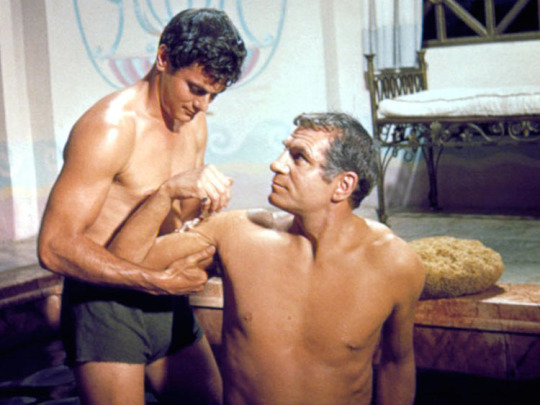
[platonic bonding: Tony Curtis and Laurence Olivier share a bath]
Now, as I said, I don’t know if that oyster reference in Good Omens was a nod to all of this (we should ask @neil-gaiman about it!), but on the whole it seems likely? Both Spartacus and that scene loom large in movie history, and Good Omens was peppered with careful historical and cultural references. For instance, the Petronius mentioned in that same scene has been confirmed to be Nero’s chief fashionista and famous gourmet - and possibly the author of tongue-in-cheek, outrageously funny novel Satyricon.
So there you go. It should be noted that despite the (cautious) steps forward we’re taking to normalize queer relationships on screen, movies set in Antiquity continue to be ridiculously straight. Here’s to hoping that changes soon.
#ask#good omens#spartacus#kirk douglas#stanley kubrick#lgbt representation#lgbt history#lgbt characters#movie history#hollywood#oysters and snails#ancient rome#bisexuality#classics#go meta#crowley and aziraphale
178 notes
·
View notes
Video
youtube
New video essay! Internet reactionaries argue as though they have no core beliefs at all, and will just say anything to own the libs. So are they nihilists, or is there more going on?
You can ensure this series continues by backing me on Patreon.
Transcript below the cut.
Say, for the sake of argument, you’re online blogging about a Black journalist’s commentary on marketing trends in video games, movies, and comic books, and you’re saying how the vitriol in response to her fairly benign opinions reveals the deep-seated racism and misogyny in a number of fan communities, most especially those that lean right, when a right-leaning commenter pops in to say, “Or maybe they just actually disagree with her about marketing trends! For Christ’s sake, there’s no mystery here. People aren’t aren’t speaking in coded language. They are telling you what they believe. She had a bad opinion; why do you have to make it bigger than that? Why can’t you ever take people at their word?”
You pause and ponder for a moment. Mmm… Aw heck with it, you’re in a discoursing mood. Let’s do this.
“Mr. Conservative, in order for me to take you at your word, your words would have to show some consistency. Let me just lightning round a few questions about the reactionary web’s positions on marketing trends: Do you believe that having the option to romance same-sex characters in an RPG turns the game into queer propaganda, or do you believe that killing strippers in an action game can’t be sexist since no one’s making you do it? Do you believe that the pervasiveness of sexualized young women in pop culture is just there because it sells and that’s capitalism and we all need to deal with it, or do you believe that a franchise has an obligation to cater to its core audience even if diversifying beyond that audience is more profitable? Do you think words are inherently harmless and only oversensitive snowflakes would care about racialized language, or do you think it’s racist if someone calls you mayonnaise boy? As long as I’ve got your ear: Are you the Party that believes in the right to keep and bear arms because you’re distrustful of all authority and what if we need to overthrow the government someday, or do you believe that cops are civil servants and we should trust their account of events whenever they shoot a Black man for looking like he might have a gun?
“Does optional content reveal a game’s ideology, or doesn’t it? Is capitalism a defense for decisions you don’t agree with, or isn’t it? Is language harmful, or not? Do you hate authority, or love cops and the troops?
Alright, alright, ease off. Add some nuance. “Now, I know the Right is not a monolith, and maybe these arguments are contradictory because they’re coming from different people. We’ll call them Engelbert and Charlemagne. Maybe Engelbert’s the one who thinks any institution funded by tax money is socialist and therefore bad and Charlemagne’s the one who says we should dump even more tax money into the military and thinking otherwise is un-American. But here’s the thing: Y’all have very fundamentally different beliefs, and you’re so passionate about them that you enter search terms into Twitter to find people you don’t even follow and aggressively disagree with them, and, yet, you’re always yelling at me and never yelling at each other. What’s that about?
“And I can’t say how often it happens, but I know, if I let Engelbert go on long enough, he sometimes makes a Charlemagne argument. And vice versa.
“And, I see you getting ready to say, ‘The Left does the same thing,’ but ba ba ba ba ba, don’t change the subject. That’s an extremely false equivalence, but, more importantly, it doesn’t answer my question. What do you actually believe, and why are you so capable of respecting disagreement between each other, yet so incapable of respecting me - or, for that matter, a Black woman?
“See, I don’t take you at your word because I cannot form a coherent worldview out of the things you say. So, forgive me if, when you tell me what you believe, I don’t think you’re being candid with me. It kinda seems like you’re playing games, and I’m the opposing team, and anyone who’s against me is your ally. And you’re not really taking a position, but claiming to believe in whatever would need to be true to score points against me, like we’re in that one episode of Seinfeld.” [Card Says Moops clip.]
(This is borrowed observation #1, link in the down-there part.)
Hoo, it feels good calling people hypocrites! Person says B when earlier they said A and you point out the contradiction! You don’t take a position on A or B, and you still “win”! I see why Republicans like this so much.
But that’s the kind of point-scoring we’re here to deconstruct, so let’s get analytical.
There’s a certain Beat-You-At-Your-Own-Gaminess to the Card Says Moops maneuver. “Safe spaces are bullshit, but, if you get one, I get one too.” “There’s no such thing as systemic oppression, but, if there were, I’d be oppressed.” It’s dismissing the rhetoric of social justice while also trying to use it against you. Claiming “the Card Says Moops” does not, so much, mean, “I believe the people who invaded Spain in the 8th Century were literally called The Moops,” but, rather, “You can’t prove I don’t believe it.” Not a statement of sincere belief, simply moving a piece across the board. All in the game, yo.
If they could be so nakedly honest with you and themselves to answer “what do you actually believe” truthfully, one suspects the answer would be, “What difference does it make? We’re right either way.”
This has come to be known as “postmodern conservatism,” a fact I find hilarious, because, in The Discourse, “postmodernism” is a dogwhistle for everything the Right hates about the Left. (...it also means “Jews.”) Postmodern conservatism is the thinking that, at least for the purpose of argument, the truth of who invaded Spain is immaterial. You have your facts, I have alternative facts. What is true? Who’s to say?
Regardless of what you actually believe - what you believe serving no rhetorical purpose - you are at least arguing from the position that material truth does not exist. Truth is a democracy. Whoever who wins the argument decides who invaded Spain.
It would be reductive to blame this pattern of thought on the internet, but its recent proliferation isn’t really extricable from the rise of chan culture (this is borrowed observation #2, link in the down there part). 4chan didn’t cause this thinking, but sites like 4chan reveal it in its most concentrated form.
The two most common properties of a chan board will be anonymity and lack of moderation, which means, among other things, that you can say whatever you want with no systemic or social repercussions. People may disagree with you, but it carries no weight. You won’t be banned, you won’t have your comments deleted, and, because there’s no way to know whether any two posts are made by the same person, you won’t even get a reputation as “the person with the bad opinion.”
The effect this has on the community is that there is no expectation, in any given moment, that the person on the other end of a conversation isn’t messing with you. You can’t know whether they mean what they say or are only arguing as though they mean what they say. And entire debates may just be a single person stirring the pot. Such a community will naturally attract people who enjoy argument for its own sake, and will naturally trend towards the most extreme version of any opinion.
In short, this is the Free Marketplace of Ideas. No code of ethics, no social mores, no accountability. A Darwinist petri dish where ideas roam free and only the strong ones survive. If the community agrees Bebop is better than Eva, well, then I guess Bebop is better than Eva, because there wasn’t any outside influence polluting the discourse. Granted, it could just be a lot of people thought it was funny to shit on Eva, but it’s what the community has decided, so it will at least be treated as truth.
This demands that one both be highly opinionated and to assume opinions are bullshit, to place a high premium on consensus and be intensely distrustful of groupthink.
A common means of straddling these lines is what I call the Stanislavski Opinion: the opinion you entertain so completely that you functionally believe it while you express it, no matter the possibility that you will express - and, to an extent, believe - an opposite opinion later. Most of us go through a phase in our youths where we’re online and like the idea of believing in something, but don’t know what to believe just yet, so we pick a position and find out if we believe it by defending it. We try on ideologies like sunglasses off a rack. Most of us will eventually settle on a belief system, and this will usually involve some apologies and some comments we wish we could scrub from the internet, but it’s an important stage of growing up.
But some percentage of people will seek out a space where there is no embarrassment, the comments scrub themselves, and never growing out of the Stanislavski Opinion is actively rewarded. There, figuring out what you believe would make your ability to argue less flexible, and, besides, if you believed anything unironically, much of the community would still assume you’re trolling. Where no one is bound by their word, what, really, is the difference between appearing to have an opinion and having one?
Sincerity is unprovable and open to interpretation. Decide someone is sincere if you want to make fun of them, decide they’re trolling if you want to make fun of someone else. What is true? What do you want to be true? It’s easy enough to start thinking of one’s own opinions the same way: What do I believe? What is it advantageous to believe? Your answer isn’t binding. You’ll change it later if you need to.
The person I’m describing, you spend time online, you’ll meet him a lot. His name is Schrodinger’s Douchebag (borrowed observation #3, link in the down there part): A guy who says offensive things & decides whether he was joking based on the reaction of people around him. Any website that lacks effective moderation and allows some level of anonymity will, to varying degrees, approximate 4chan, and be overrun with Schrodinger’s Douchebag.
When this type of person defends rape jokes by saying all humor is inherently punching down because there must be a butt to every joke, he hasn’t thought about it. He assumes it’s true, because he figures he’s a smart guy and whatever he assumes is probably right, but he’s unfazed if you prove otherwise; there’s no shortage of dodgy reasons he might be right and you wrong. He’ll just pick another one. What matters is that the game continues.
The thing is, Bob, it’s not that they’re lying, it’s that they just don’t care. I’ll say that again for the cheap seats: When they make these kinds of arguments, they legitimately do not care whether the words coming out of their mouths are true. It is a deeply held belief for precisely as long as it wins arguments.
So it’s kinda funny, right, how many of these folks self-identify as “rationalists?” I mean, typical rational thinking would say: If I am presented with the truth, I will believe it, and, once I believe it, I will defend it in argument. This? This is not that! This is a different idea of “rationality” that views it not as a practice but as an innate quality one either possesses or lacks, like being blond or left-handed: If I’m arguing it, I must believe it, because I’m a rational person, and, if I believe it, because I’m a rational person, it must be true. You speak assuming you’re right, and, should you take a new position, this telescopes out into a whole new set of beliefs with barely a thought. Stay focused on the argument, and you won’t even notice it’s happening.
You might now conclude the internet reactionary believes in nothing except winning arguments with liberals. And, like Newtonian physics, if you assume this framing, you will get highly useful results. If you enter conversation with Engelbert and Charlemagne believing they do not mean what they say, they are only entertaining notions, and, on a long enough timeline, they will eventually defend a position fundamentally incompatible with the one they defended earlier in the same argument, you will navigate that conversation much more effectively!
But, like Newtonian physics, this framing is lowercase-a accurate without being capital-T True.
In reality, nihilism isn’t that popular. People will tell you, “I don’t care about anything, I just like triggering the libs,” but why is it always libs? It is piss easy (and also hilarious) to upset conservatives, why only go after the SJWs? The easy answer is, well, if you upset a feminist, you might make her cry; if you upset a Nazi, he might stab you, and that has a cooling effect. But the more obvious answer is that they actually agree with the racist, MRA, and TERF talking points they repeat, but would rather not think about it.
So much of conservative rhetoric is about maintaining ignorance of one’s own beliefs. To uphold the institution of imperialist white supremacist capitalist patriarchy while thinking you are none of those things. (Well, OK, knowing you’re a capitalist, but thinking it’s a good thing.) Most people have a baseline of fairly conventional, kindergarten morality, and conservatism often clashes with it. You can rationalize these contradictions - “I’m not a bigot, I just believe in states’ rights” - but, as American conservatism gets more radical, it gets harder to square one’s politics with what one assumes to be one’s beliefs. So you learn, when someone challenges you, to cycle through beliefs until something sticks, just play your hand and trust that you’re right, or, in extreme cases, insist you have no beliefs at all, you’re just here to watch the world burn.
But they’re not. They are willing participants in the burning of only certain parts. They don’t care what they believe, but they know what they hate, and they don’t want to think about why they hate it. On paper, they believe in freedom of religion and freedom of expression, but they also hang out in communities where Muslims and trans women are punching bags. And, like a sixth grader who believes one thing in Sunday school and another thing in biology class, they believe different things at different times.
This thinking is fertile ground for Far Right recruitment. I’d say the jury is out on whether chan boards attract Far Right extremists or are built to attract Far Right extremists, but they’re where extremists congregate and organize because they’re where extremists are tolerated, and where they blend in with the locals. They learn the lingua franca of performative irony: Say what you mean in such a way that people who disagree think you’re kidding and people who agree think you’re serious. People who don’t know what they believe but clearly have some fascist leanings don’t need to be convinced of Nazi rhetoric, they just need to be submerged in it and encouraged to hate liberals. They’ll make their way Right on their own. Folks start using extremist rhetoric because it wins arguments with SJWs - usually because that’s the moment SJWs decide it’s not fruitful and possibly unsafe talking to you - and this creates the appearance that, if it keeps winning arguments, there must be something to it. The Far Right literally has handbooks on how to do this.
Those who never consciously embrace the ideology - who don’t transition from participating to getting recruited - are still useful. They spread the rhetoric, they pad the numbers, and often participate in harassment and sometimes even violence.
There’s a twisted elegance to all this. Think about it: If you operate as though there is no truth, just competing opinions, and as though opinions aren’t sincere, just tools to be picked up and dropped depending on their utility, then what are you operating under? Self-interest. The desire to win. You’ll defend the Holocaust just to feel smarter than someone, superior. Think about how beautifully that maps onto the in-group/out-group mentality of dominance and bigotry. Think how incompatible it is with liberal ideas of tolerance. I think this is why we don’t see a lot of these “I’m just here to fuck shit up” types on the Left. Don’t get me wrong, the Left has gotten on some bullshit, but (excepting politicians, whom you should never assume to mean anything they say) it’s sincerely-believed bullshit! We don’t build identities around saying things just to piss people off.
The takeaway from all this is not only that you can’t tell the difference between a bigot who doesn’t know they’re a bigot and a bigot who knows but won’t tell you, but that there is no line dividing the two. When some guy, in the middle of a harassment campaign, says the victims should be nicer to their harassers because that will “mend the rift,” I don’t know if he believes it. But, in that moment, he believes he believes it. And that scares the shit out of me. But, if you’re asking how many layers of irony he’s on as compared with the harassers, nine times out of ten it doesn’t matter.
Borrowed observation #4 is: “We are what we pretend to be.”
205 notes
·
View notes